#Alice Dartmouth
Note
assuming that Bella's blood has the cure for vampirism and after marriage (without Renesmee) all the Cullens revert back to being human what would they do first? would they settle down in the forks or go to some sunny town? what kind of relationship would they claim to explain the family relationship? Would Bella and Edward go to college or would she end up having an accidental human baby?
I think Alice would realize right away that she kind of hates being human and would be like "brb heading to Alaska to get Tanya to change me back, c'mon Jazz" and she and Jasper would become vampires again. Hopefully they don't have to 'start over' as newborns, though? Then end up watching over the human Cullens because they're pretty vulnerable now.
Bella and Edward would to go Dartmouth and . . .yeah if SM writes it they absolutely will end up having a baby. Hopefully with a different name though because she's no longer "the most unique baby in the world."
Rosalie and Emmett try to have a baby on purpose.
Carlisle insists everyone get vaccinated for like EVERYTHING, ASAP. He and Esme probably also try for a baby pretty quickly. I see some fics that are like "they don't need/want kids they already have them." Adoption is 100% valid! But adopting teenage vampires is not the same as raising a child that grows and changes. I think they'd still want that more authentic experience. Or maybe they DO genuinely adopt--not a baby, but an older kid, maybe ironically even teens.
My guess is that they'd go with a siblings story, if they live together at all. Rosalie and Carlisle could be sister and brother; so can Esme and Edward.
They probably all go to New Hampshire so Bella can go to Darmouth. There's a huge hospital up there, too, and a medical school so Carlisle could work at either or both.
Although I might be biased on that because I live in New Hampshire. I see the helicopter flying from our local hospital to the Big One in Lebanon a few times a week.
With everything else I didn't like about Breaking Dawn, teasing them moving to New Hampshire and NOT FOLLOWING THROUGH was the cherry on top, haha. I've said she couldn't have written a book more thoroughly designed to annoy me if she knew me in person and did it on purpose, and I mean it.
#supernatural pregnancy? check#magic genius baby? check#made-up distracting name? check and double check#bella magically good at being a vampire right away? check#NH fake out? check#like remember they were going to go to alaska or nh#so why did they build them a cottage in forks!!!#they weren't going to stay in forks!!!#it makes no sense!#asks
51 notes
·
View notes
Note
Alright! That's the first time I send an ask message to someone I don't know and probably the last one (because, honestly, is kinda scary) but listen, baby, you had NOT the right to make me addicted to a fic where the mass-murderer-nightmare-of-the-south Major Jasper Whitlock is a whole ass baby daddy!!!! Seriously, I'd never imagine I'd read something like that and LOVE IT??? I mean, I could picture Alice being a mom in some aus, since her character seems to be very attached to the idea of having a family, but Jasper???? The one who killed a thousand of vampires and non-vampires with no mercy???? I have only one thing to say: I need more.
There is no way you're as scared of me as I am of you. I think we should just agree to be scared together.
Anon, THANK YOU for your message. All my messages mean so much to me, and to know that I've written something that you didn't expect to love? Ugh, made my day. My week.
The thing about babyverse is that I smashed out like 8k words of it during a Bad Time; I was having some kind of mental breakdown and writing the OG version was my way of mainlining a carton of ice cream and a bucket of fries to cope with my woes. I actually fucking hate baby fics because Jasper and Alice are not parents. Every single baby-related fic that I read on FF.Net pissed me off. But my brain ran away with me and then I decided to riff on the concept and we ended up with five or six variations on a theme, one of which you guys *love*.
I think the thing that is important to remember about Jasper is that he is an ice-cold killer, one of the most dangerous vampires on the continent with a strong reputation even though he walked away over *eighty* years ago.
In Hybrid-verse, this means there are people in the known that lie away at night wondering exactly what happened to Maria's Major because his reappearance would be catastrophic. None of his past changes because he has a son and a partner; it arguably makes it worse. He still suffers from depression, he still has guilt and shame, and now he's somehow ended up with a mostly-human son to raise.
And the fact that he wasn't close to his father, and has vague memories of Civil Era parenthood has him crazy unprepared for being a dad (he is totally stunned the first time Alice just casually breastfeeds Ollie in front of him one night; she teases him mercilessly that they can have sex and have a kid, but breastfeeding shocks him.)
As for Alice, she's just always an agent of chaos. I have a very, very hard time imagining her as a mother - baby-verse and the AH tattoo fic are the only two I ever bothered attempting that (and tattoo-verse is kind of a riff on a lot of the AH fics written in '05, so it doesn't really count.) Alice is always going to be authentically herself, and being a mother doesn't change her. Ollie is just the best-dressed kid in the room.
So have a little snippet of the OG, Official (if there ever is such a thing) Babyverse
“Oh my god, Jasper.”
I gaped at him as Ollie babbled at me, his chubby hands patting at my cheeks.
It had been two months since the Cullens had arrived back in Forks, since Jasper had come home to me - and to Ollie. It had gone by faster than I thought possible, honestly.
Edward and Bella had decided to get married in the last weeks of August - the plan was the wedding, a quick honeymoon somewhere in South America (a surprise for Bella, apparently), and home just in time to start freshman year at Dartmouth. Well, ‘home’ would be the house that Esme had picked out in New Hampshire. I didn’t know if they were even planning to come back to Forks after the wedding.
It felt like a strange and rushed choice after being apart for a year, but I had congratulated them and was pitching in with the wedding planning. They were happy about it, and that was the most important thing.
My own college plans were a lot more diaphanous than Bella and Edward’s, and I was mostly content just to work out my new normal with my son and my quasi-boyfriend. The summer wasn’t over yet, and I knew I’d have to have a few hard conversations before it was over - mostly that if the Cullens wanted to go to New Hampshire and play college students, I would be staying here in Forks with my family - Simon had suggested taking a bunch of community college credits online to stretch my college fund a little further and to keep me close to home for a while.
Adjusting Ollie on my hip, I gave Jasper a Look, as he tried not to meet my gaze. Since we’ve gotten home, he’d been… well, amazing. No one had ever taken co-parenting as seriously as Jasper was, and I had never seen as many parenting books as Jasper had somehow collected that first week. The Cullen house suddenly boasted an unnecessary amount of baby paraphernalia (right down to the framed photographs that Esme had asked Dad and I for - I had been mildly horrified to see my first photo with Ollie framed on the upstairs console table; my sweaty, disorientated, and white as a ghost face with Ollie on my chest immortalised next to Rose and Emmett in a Venetian gondola had really done a number on my self esteem.)
But Jasper had give me an insane amount of things since he’d gotten home. First it had been a new baby swing when mine ended up dying spectacularly. Then - when Esme found out that Ollie was an unenthusiastic sleeper at the best of times - there had been an insanely expensive cot that was meant to encourage him to sleep. Then there were books and toys - most of them under the guise of bonding with him. And then a second set of everything at the Cullens because Jasper didn’t want me lugging so many things with me every time we came over.
(Rosalie had - with all the subtly of an infomercial - asked me if I preferred bracelets or rings, and I had had to squash the idea of any kind of jewellery as a gift. Both of the Cullen women had grown up in an age where the birth of a healthy son and heir would have come with a sparkly piece of jewellery and I thought that was so gross. Jasper had listened to me rant for nearly fifteen minutes, bewildered, after Rosalie and Esme had been insisting he had to gift me some kind of diamond for Ollie - preferably in blue - for weeks. Cynthia had thought I was insane to refuse. The first and only gem I would accept from Jasper would be an engagement ring - when we were ready.)
And now, there was the latest - and most expensive - of his gifts.
“You bought me a car?” I said dumbly.
The blue SUV parked out the front looked perfectly normal; shiny and new but not out of place. It was no Mercedes Guardian or Aston Martin or whatever BMW Rose was driving. And I kind of liked that - no one would give it a second look in Forks.
The thing was, a car had been a much contested item in my family - the ancient little car Cynthia and I had been sharing had finally crapped out beyond repair and we had ended up pooling our savings to save for a new one. We were about three thousand dollars off something decent - Dad and Simon were vetoing anything that they didn’t deem safe enough. Simon and Dad were generous enough to occasionally loan me one of their cars, and Jasper had been more than willing to chauffeur me around.
Until now.
“I know you and Cynthia were saving for one,” Jasper began, reaching out to tuck one of Ollie’s curls out of his eyes. I was putting off getting his hair cut because his messy hair was too cute to lose. “But I was thinking…”
“Jas.”
“Cynthia has so many co-curriculars, and spends so much time on the Res that it felt like you’d be spending a lot of time in the car - or not getting to use it as much.”
I was still giving him a Look as Ollie had moved on to grasping at my necklace, fascinated.
“…I wanted to make sure you were safe,” Jasper said finally. “Rose helped me pick it out - and the carseat. Both have the best safety ratings on the market.”
Walking closer, I could see the carseat already fitted in the backseat. It was, frankly, perfect. I was concerned about the qualifier ‘on the market’ - I wouldn’t put it past Jasper to try and get some kind of unreleased bomb-resistant baby carseat.
“The car or the carseat?” I asked, looking back at him - he was finally looking a little bit guilty.
“What?”
“Which is the safest you could find - the car or the carseat?”
“Both.” Jasper looked at me and offered out the keys. Ollie reached out for them with a squeal of delight. “Let me do this for my family, Alice. I want to make sure you have what you need.”
It was hard to argue with him when he called us his family. It always made me melt a little, that he thought of us that way. I had had to squash more than one of his old-fashioned ideas of babies and parenting over the last two months, but his staunch determination to take care of us always made me give in.
The car was staying. I didn’t have it in me to argue when he was looking at me with that oddly hopeful gaze. And he wasn’t wrong - I did need a car, I wanted it to be a good and safe one, and it wasn’t like he’d gone out and gotten me something ultra expensive…
“HE BOUGHT YOU A CAR?”
The front door banged, Cynthia bolted onto the street, her eyes huge and her hands on her hips.
“All your brothers are married, right Jasper?” She asked before darting over to the car to inspect it.
“Nearly.” Jasper was trying very hard not to laugh; he really did get a kick out of Cynthia’s Teenage Drama Queen brand of dramatics.
“I am doomed to forever have to work for my money,” Cynthia sighed, pulling back and looking over at us. She’d gotten a job at Forks’ bakery slash ice cream slash coffee shop and had spent the last month acting like she was being forced to work in the mines in the dead of winter. It was eternally entertaining, and she was keeping the house supplied in free pastries, ice cream, and bread. “Give the baby to Jasper, Alice.”
I looked over and Jasper looked so hopeful, his hands already twitching.
“He always just stands there with this half sad-puppy, half-hopeful look that you’ll read his mind,” Cynthia said bossily. “Every single time, you wait for her to offer. Just take him - I do.”
Ollie let out a crow of delight as Jasper took him, babbling happily and waving my new car keys in one hand. Jasper had a look of such tenderness on his face that I felt bad he thought that I had some kind of ownership over the child we shared. That he felt he couldn’t just ask to hold Ollie.
“Hello Oliver,” he said, holding him so carefully. “Are you being good for your mother?” He got a spit-bubble reply; it had only taken two months for Ollie to recognise that Jasper was one of his people.
“You can ask me for the baby, Jas,” I said softly, leaning against his other side; his arm wrapping around my shoulders automatically. “You can hold your son, you don’t need my permission.”
“I don’t like to upset him; he’s always so happy with you,” Jasper murmured, nodding as Ollie brandished the keys at him importantly.
I rolled my eyes fondly. Ollie was happy when Jasper held him. Our son had taken like a duck to water at the sudden reintroduction of the Cullens to our lives; Esme was good for cuddles, Emmett was the one that would give me a heart attack by tossing him in the air and swooping him around until Ollie was red in the face and laughing, and Rosalie was someone that he was entranced with - something about the way that she was with him made Ollie go all soft and angelic when he was with her. Little ratbag had Auntie Rose wrapped around his little finger - probably why she had helped Jasper with the car.
Ollie still held a grudge against Carlisle for giving him his shots last month, hiding his face every time he saw him. Edward and Bella were terribly awkward around Ollie, but kind to him. Ollie adored Edward playing the piano, and every time Edward had played for him, he had been transfixed.
Whilst Jasper might have been one of Ollie’s people, he was only just grasping the concept of ‘Daddy’ and Jasper being one and the same. We would get there eventually. He was only a baby.
“Thank you for the car,” I said softly. “You didn’t have to, but I love it.”
“You do?” Jasper adjusted his grip on Ollie, before pulling me closer.
“I do. But you don’t need to buy me or Ollie all these things.”
He really didn’t. About two weeks after he got back, Cynthia had read him the riot act and pointed out that since he didn’t sleep, he could be pulling the nightshift, and maybe slip me the occasional twenty so I could buy diapers. That had resulted in him giving me a credit card, the acquisition of the sleep-training cot, and him literally expecting to sit in the tree outside my bedroom and watch over me and Ollie. He’d been surprised when I’d given him a set of house-keys, and allowed him to bring books and a laptop over so he didn’t have to actually watch us sleep. More than one night, he’d ended up in the living room giving Ollie a bottle and reading him back to sleep. There was nothing cuter than going downstairs in the morning to find Ollie passed out asleep on Jasper’s chest, as Jasper read some heavy book over his head.
“I want to. I love you both so, so much. This is nothing, Alice. This is just a car,” he said softly.
“Can you two kiss so we can go inside and I can make Dad and Pa feel bad for me?” Cynthia called and I started laughing, Ollie cooing at us before giggling along with me.
The rest of the Cullens had given no indication whether or not they would be relocating to New Hampshire any time soon, and I hadn’t asked because it wasn’t a conversation I wished to have: I was staying in Forks with my family and my son for the foreseeable future, and no amount of bribery would make me budge.
Not that Jasper would even try, I knew that. We had talked in through and he understood that I wanted this time with my father and with Simon and with Cynthia.
Jasper had been spending every spare moment with us, and desperately compensating for leaving me; I knew that Carlisle and Esme had given my parents half of the cost of my medical care for the pregnancy (which neither of my parents wanted to accept until I pointed out that the financial hit would affect Cynthia’s college options, not to mention finishing the house renovation. It might have been loose change to the Cullens, but that money made a difference to us.)
#when it comes to fit i am that food critic from ratatouille#my fic: hybrid babyverse#just imagine rosalie quizzing jasper on infant care#both of them taking it more seriously than the mcats#also push presents are gross#alice is a strong independent eighteen year old#jasper is so out of his depth and he loves it
13 notes
·
View notes
Text
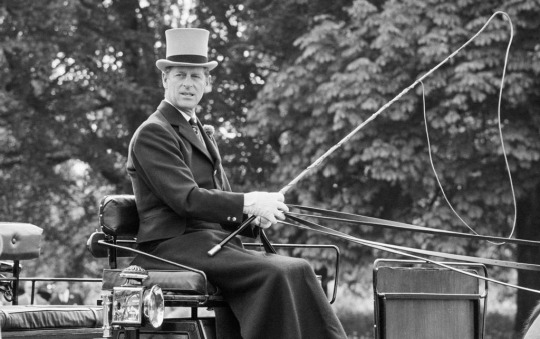
The Duke of Edinburgh 10 June 1921-9 April 2021
Horse & Hound | Published 15 April 2021
THE contribution of HRH Prince Philip, Duke of Edinburgh, to equestrianism was profound. He was not content only with enjoying horse sports as a keen competitor, but also gave back a huge amount of time and commitment in leadership and management, which had great impact on competitive riding and driving throughout the latter part of the 20th century.
His innovative 22-year term as president of the FEI, his work in developing the sport of driving trials and his impact on English polo all complemented royalty’s traditional involvement in racing and hunting, augmented by The Queen’s lifelong interest in breeding horses and ponies. Prince Philip was therefore a mainstay in the royal family’s patronage of British equestrianism throughout the post-war years and into the new millennium. He firmly encouraged his children to ride and took great pleasure in the achievements of the Prince of Wales in polo and the hunting field and the Princess Royal in horse trials and racing.
The Queen’s consort brought a fresh approach to the horseworld, with the same energy he devoted to so many other interests, ranging from conservation management to sailing. In the horseworld, as in every other aspect of an extraordinarily varied life, Prince Philip exercised a sharp wit and ironic humour, sometimes understood and appreciated, sometimes not. He was an extremely entertaining companion, especially at dinner after a day’s sporting activity.
The early years
IT is easy to forget that Prince Philip’s background and early childhood were far removed from the environment in which he became prominent as a leader of British horsemanship.
His birthplace was the royal palace of Mon Repos on the Greek island of Corfu on 10 June 1921, but he was not to remain there long. Philip left Greece as a baby, travelling in a hastily improvised cot of orange boxes when he was only a year old. He left so unceremoniously because his parents, Prince Andrew of Greece and Princess Alice of Battenberg, were exiled by the Greek government after Prince Andrew became the scapegoat for his country’s military disasters in Turkey.

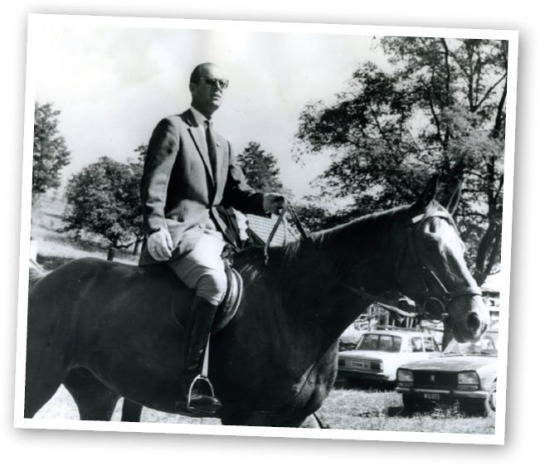
As a result, Prince Philip had a cosmopolitan childhood and teenage years of wandering, much of it spent at the homes of his four elder sisters, all of whom married into the German nobility. He spoke several languages. His father’s ancestry was not Greek, but essentially Danish, and some said Prince Philip’s appearance owed much to his Viking ancestry. His early schooling was in Paris before prep school at Cheam and then Gordonstoun and the Royal Naval College, Dartmouth, which launched his naval career.
His mother was often unwell and his father died in 1944. His mother’s brother, Admiral of the Fleet Earl Mountbatten of Burma, known to the royal family as Uncle Dickie, had most influence on Philip’s early life.
Mountbatten, a distinguished wartime naval officer and post-war international statesman, was one of the most persuasive, active and distinctive personalities in public life, and his influence on Prince Philip – and later Prince Charles – was profound. No one was more bereaved by Mountbatten’s assassination in 1979 than his royal nephew.
“The greatest game of all”
UNCLE DICKIE was renowned as a keen polo player, author of the standard work,An Introduction to Poloby “Marco”. He steered his nephew towards playing polo and, it was said, helped somewhat to steer him in the direction of marrying the future Queen of England on 20 November 1947. Anyone who knew Prince Philip could not have doubted he was always his own man in making major decisions.
His love of polo was born in Malta during his life in the Royal Navy. The Queen and Prince Philip lived in married quarters on the island soon after their marriage when the Prince commanded a frigate in the Mediterranean fleet.
From 1952, when The Queen succeeded to the throne, Prince Philip found “relaxation” from royal duties in hectic polo played at Cowdray Park, often being invited to ride Lord Cowdray’s polo ponies.
In his bookMen, Machines and Sacred Cows, Prince Philip recalled his polo-playing years with much affection: “Hot, tired and frequently hurting, you make your way back to the pony lines, thank the grooms, pat the ponies which did well and make friends again with the ponies who did not. Then for a shower, a change, almost the best moment of all, a cooling and refreshing drink with friends and kindred spirits to whom polo is not just a game, but the greatest game of all.”
Lord Cowdray was instrumental in helping to revive polo in post-war Britain on his West Sussex estate. Noticing how many Household Cavalry and Household Brigade officers were playing, Prince Philip provided the impetus for the formation of the Household Brigade Polo Club (now Guards) at Smith’s Lawn, Windsor Great Park, in 1955. Smith’s Lawn was to become a focus for much of the royal family’s leisure time.
The Queen was a frequent spectator and Prince Charles remembers Windsor Park as an early influence in watching the game – and wanting to take part. Prince Philip became one of the top eight players in Britain in the 1960s, achieving a highest handicap of five.
He summed up his attitude to polo: “I suppose every games player thinks his particular game is better than any other. I am no exception. I have no objection whatsoever to others enjoying their particular game, but give me polo every time.”
Polo buffs reported that the Prince had received some domestic advice on the tendency for some polo team members to use expletives during moments of stress in the game, some of which wafted over to the spectator area, including the royal pavilion where The Queen poured out the tea at après-polo tea parties on a Saturday afternoon. He wrote inThe Horseman’s Year: “Wives have been known to have very firm views about the way both their husbands and other players conduct themselves on the ground.”
Prince Philip captained teams at Windsor throughout the 1950s and 60s. He knew people throughout the sport and visited many of the smaller clubs, such as Toulston, Cheshire, Tidworth and Kirtlington, remarking: “Whenever I have managed to get away to play on some of these grounds, I have a wonderful time... the hospitality offered to visiting teams does nothing to improve the standard of play.”
The royal Duke, aided by Lord Mountbatten, was a firm mentor of Prince Charles in playing the game. Prince Charles, aged 15, received from his father his first polo pony, named San Quinina. He remembered later: “My father was a very good instructor and he gave me the basic techniques.”
Press photographers snatched pictures of Prince Philip giving his son “a serious talking to” in his coaching capacity after his early matches at Smith’s Lawn. In April 1967, Prince Philip played in the Windsor Park team with Prince Charles, Gerard Leigh and William Loyd. It was Prince Charles’s first success in tournament polo, playing for the Combermere Cup. Prince Philip and his son both scored in the final, with The Queen watching.
When The Queen came to present the cup, Prince Philip presented Prince Charles to The Queen with the remark: “This is one of my team-mates, I believe you know him...”
It was typical of Prince Philip that he made a firm decision to give up playing polo in 1971, with the remark: “I reckoned 50 was quite old enough for that game.”
A new discipline
PRINCE PHILIP was increasingly suffering from arthritis in his wrist, but he was soon keen to develop another equestrian interest – competition carriage driving. He took up the sport soon after retiring from polo, using five Cleveland Bays from the Royal Mews, with the keen co-operation of the crown equerry, Lt Col Sir John Miller, a natural horseman and a great hunting man and carriage driver.





Prince Philip said he largely trained himself in carriage driving, through practising hard on the long paths across the Sandringham estate, with help from Major Walter “Tommy” Thompson, former riding master of the Household Cavalry.
Soon Prince Philip excelled as a four-in-hand driver and he plunged into international contest. He was perfectly at home with the great many characters in the sport, from all sorts of backgrounds, and with them he would argue into the night – tactics and the best use of vehicles and harness.
George Bowman, the great Cumbrian whip, and many other driving experts from all over the world, were warmly welcomed by the Prince at Windsor, and various German cousins would be seen as passengers on his driving vehicles. As well as competition carriage driving, Prince Philip was an active member of the Coaching Club, which helped to ensure jolly drives, accompanied by ladies and gentlemen as guests, at royal venues such as Hampton Court and Sandringham. Prince Philip would drive a carriage from the Royal Mews at Windsor to polo at Smith’s Lawn with The Queen as passenger beside him.
He virtually invented the modern competitive driving sport, as president of the FEI from 1964 to 1986. With help from Col Sir Mike Ansell, Prince Philip drew up rules for “combined driving”, including the exciting marathon phase across country and the fiendishly difficult obstacle course.
After “a bit of arm twisting”, as he put it, Prince Philip ensured that competition carriage driving was firmly attached to the Royal Windsor Horse Show from 1971. He took part in the European Championships at Windsor in 1973 and was disappointed, but not discouraged, when he had to retire with a bent axle in the last hazard of the marathon. He completed one of only three clear rounds of the obstacle course to finish second in that phase.
Vehicles crashing or overturning were a regular feature of the marathon phase, and the royal whip seemed to relish the risks. He represented Britain in three European Championships and six World Championships. In the 1982 World Championships in the Netherlands, he finished sixth overall out of 39 entries; the same year he was the overall winner at Windsor. The Royal Mews, formerly the preserve for ceremonial work of the Cleveland Bay, Britain’s only true native carriage horse, saw the arrival of horses crossed with Oldenburgs, which Prince Philip believed had “probably the best paces of any of the carriage breeds”, which he deemed best for competition work.
Rather like Uncle Dickie, Prince Philip produced a worthwhile handbook on his sport, which has stood the test of time. The excellentCompetition Carriage Driving,published in 1982, reveals the Prince’s love of mechanical detail. He gives the fullest explanations of the construction of carriages and harness and reveals his own innovative approach. He gained some advice and help from British Aerospace in building a strong, but lightweight, metal, dual-purpose carriage for the presentation and dressage phase, as well as the marathon.
Prince Philip provided some merriment for the equestrian press when he was explaining in detail his views on such technical matters as swingletrees, at a press conference in the Royal Mews to launch his book. Suddenly, he received a question about details of the forthcoming marriage of Prince Andrew. It came from a tabloid reporter, who had infiltrated the gathering.
The affable Prince gave way to a very annoyed royal personage.
“I am certainly not here today to discuss trivia,” he said sternly. He instructed his aides: “Get that man out of here!”
In 1986, Prince Philip, aged 65, gave up driving horses in harness and switched to driving teams of home-bred Fells, which were otherwise used for stalking at Balmoral. He continued competition driving with teams of ponies, often just as hectic and hazardous as the horse competition, throughout his sixties and seventies, and clearly continued to gain great enjoyment from the sport.
He declared: “I find the pony teams class rather more light-hearted, and it has provided me with a great deal of fun. Furthermore, most of the other pony team drivers are considerably more glamorous than our colleagues in the horse teams.”
The modern horseworld
AS FEI president, Prince Philip brought his energies to bear on frequent attempts not always successful, to upgrade existing sports by rewriting their rules, causing many a pursed lip and puzzled frown to some officials. He threw himself into reforming the ramifications of horse passports – and veterinary controls – to enable competition horses to pass frontiers more easily.
Although he described himself as a “neutral chairman between the different factions in showjumping, dressage and horse trials”, he inevitably became embroiled in the post-war Olympics professional-vs-amateur debates.
Controversially, he encouraged the setting up of a category of professional riders who received advantages in terms of taxation, but were debarred from riding in the Games. The problem was that although a number of leading British showjumpers voluntarily took on professional status, too many leading jump riders on the Continent, especially the Germans, declined to do so, although their professional remuneration from the sport in various ways was just as obvious. They thereby continued to ride in the Games. This problem persisted until the International Olympic Committee abandoned the pro-am distinction for all sports competitors, but by then there had been a dearth of showjumping medals for Britain at the Olympics, and some of the former “professionals” were past their peak.

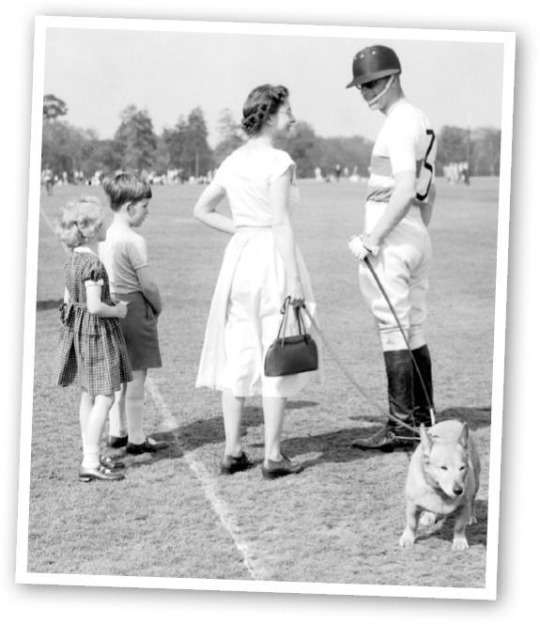
Another burning controversy, in which Prince Philip was ready to engage, was the use of phenylbutazone, or bute, on competition horses. He would tap his painful wrist, saying: “Well, I take bute – and it has done a lot for me.”
Under Prince Philip the FEI set up a system of proportional use of bute, but testing and measuring horses worldwide to ensure only the allowed percentage of the drug was present proved to be difficult and expensive. There were arguments about the results of such tests.
Eventually, the FEI had to revert to a complete ban on its use, whichH&Hargued was the only practical solution – and much easier to test.
At a line-up at the South of England show, the Prince rounded on me as the then editor ofH&Hsaying: “You got it wrong in the paper on the drugs again last week!”
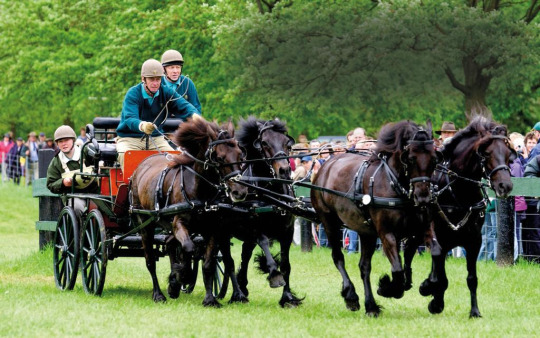
A lively discussion ensued and I suggested the Prince write a “Letter to the Editor” on the subject and, to his great credit, Prince Philip did so. It was published without any special presentation as just another letter and was never picked up by the national press.
The Prince once debated the pro-am issue over lunch in an outspoken argument with Harvey Smith and other leading showjumpers. The general view afterwards was: “We may not always agree with him, but he’s a jolly good bloke.”
The controversies were part of the growing pains of the horseworld and Prince Philip left the FEI and horse sports in a far better state overall, in terms of meeting modern conditions, when he retired as president in 1986. He was succeeded by the Princess Royal, who continued her father’s work for the next eight testing years.
Prince Philip memorably described the horse as “the great leveller”. Certainly, it was one of many ways in which he reached people across a wide spectrum. He was as enthusiastic about the Prince Philip Cup for the Pony Club – having founded the mounted games competition in 1957 – as he was about the highest levels of adult sport, and would often appear at Wembley to present the prizes, as well as taking a close interest in the qualifiers.
Prince Philip’s special legacy to horsemen in Britain – and everywhere else – is seldom quantified, but it is immense, and everyone who enjoys horses and ponies is in his debt as a great enthusiast and innovator. Royal patronage was not just a duty; it was a role carried out enthusiastically and energetically by The Queen’s consort.
In his own words: “Some optimists tend to assume that, once you have learnt the lesson that horses bite at one end and kick at the other, there is nothing further to worry about – no such luck, I am afraid. That is only lesson one in a learning process that goes on as long as you are mug enough to continue to associate with horses.”
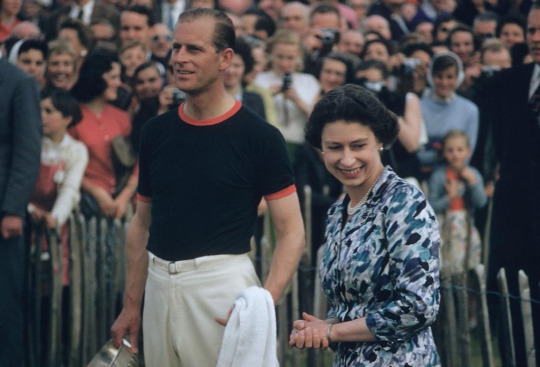
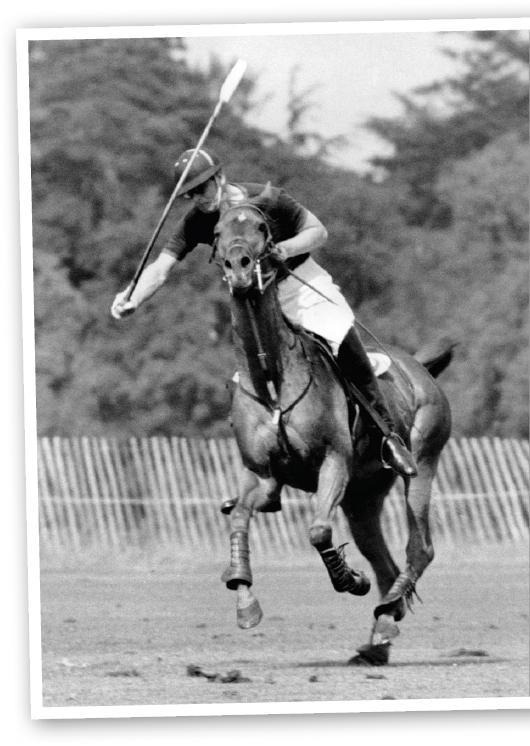
Pictures by Robin Jones/Evening Standard/Hulton Archive/Getty Images, Mark Cuthbert and United Press International. Pictures by Odhams Press Agency, David Levenson/Getty Images, Sports & General Press Agency and Mark Cuthbert/UK Press via Getty. Pictures by Tim Graham/Getty, PA Wire/PA Images, Press Association Ltd, Slim Aarons/Getty and Central Press/AFP via Getty
26 notes
·
View notes
Text

Paul Cuffee, shipbuilder, the wealthiest Afrikan in the Amerikkkan colonies, early Black Nationalist and Pan Africanist was born on January 17, 1759.
Paul Cuffee was born on January 17, 1759 during the French and Indian War, on Cuttyhunk Island, Massachusetts. He was the youngest son of Kofi or Cuffee Slocum and Ruth Moses. Paul's father, Kofi, was a member of the Ashanti ethnic group, probably from Ghana, Africa. Kofi had been captured at age ten and brought as a slave to the British colony of Massachusetts. His owner, John Slocum, could not reconcile slave ownership with his own Quaker values and gave Kofi his freedom in the mid-1740s. Kofi took the name Cuffee Slocum and, in 1746, he married Ruth Moses. Ruth was a Native American member of the Wampanoag Nation on Martha's Vinyard. Cuffee Slocum worked as a skilled carpenter, farmer and fisherman and taught himself to read and write. He worked diligently to earn enough money to buy a home and in 1766 bought a 116-acre (0.47 km2) farm in nearby Dartmouth, Massachusetts. The couple would raise ten children together, of which Paul was the seventh in line.
During Paul Cuffee's infancy there was no Quaker meeting house on Cuttyhunk Island, so Kofi taught himself the Scriptures. In 1766, when Paul was eight years old, the family moved to a farm in Dartmouth, Massachusetts. Cuffee Slocum died in 1772, when Paul was thirteen. As Paul's two eldest brothers had families of their own elsewhere, he and his brother John took over their father's farm operations and cared for their mother and three younger sisters. Around 1778 Paul persuaded his brothers and sisters to use their father's English first name, Cuffee, as their family name, and all but the youngest did. His mother, Ruth Moses, died on January 6, 1787.
In 1779, he and his brother David built a small boat to ply the nearby coast and islands. Although his brother was afraid to sail in dangerous seas, Cuffee went out alone in 1779 to deliver cargo to Nantucket. He was waylaid by pirates on this and several subsequent voyages. Finally, he made yet another trip to Nantucket that turned a profit.
At the age of twenty-one, Cuffee refused to pay taxes because free blacks did not have the right to vote. In 1780, he petitioned the council of Bristol County, Massachusetts to end such taxation without representation. The petition was denied, but his suit was one of the influences that led the Legislature in 1783 to grant voting rights to all free male citizens of the state.
Cuffee finally made enough money to purchase another ship and hired crew. He gradually built up capital and expanded his ownership to a fleet of ships. After using open boats, he commissioned the 14 or 15 ton closed-deck boat Box Iron, then an 18-20 ton schooner. Cuffee married Alice Pequit on February 25, 1783. Like Cuffee's mother, Pequit was also Wampanoag.[13] The couple settled in Westport, Massachusetts, where they raised their seven children: Naomi (born 1783), Mary (born 1785), Ruth (1788), Alice (1790), Paul Jr. (1792), Rhoda 1795), and William (1799)
In the late 1780s Cuffee's flagship was the 25-ton schooner Sun Fish, then the 40-ton schooner Mary. In 1795, the Mary and Sunfish were sold to finance the construction of the Ranger - a 69-ton schooner launched in 1796 from Cuffee's shipyard in Westport. By this time he could afford to buy a large homestead and in February 1799 he paid $3,500 for 140 acres of waterfront property in Westport. By 1800 he had enough capital to purchase a half-interest in the 162-ton barque Hero. By the first years of the nineteenth century Paul Cuffee was one of the most wealthy - if not the most wealthy - African American and Native American in the United States. His largest ship, the 268-ton Alpha, was built in 1806, along with his favorite ship of all, the 109-ton brig Traveller.
From March 1807 on, Cuffee was encouraged by members of the African Institution in Philadelphia, Baltimore, and New York to be involved in helping out the fledgling efforts to improve Sierra Leone. Cuffee mulled over the logistics and chances of success for the movement before deciding in 1809 to join the project. On December 27, 1810 he left Philadelphia on his first expedition to Sierra Leone.
Cuffee reached Freetown, Sierra Leone on March 1, 1811. He traveled the area investigating the social and economic conditions of the region. He met with some of the colony’s officials, who opposed Cuffee’s idea for colonization of Blacks from the United States for fear of competition from American merchants. Furthermore, his attempts to sell goods yielded poor results because of tariff charges resulting from the British mercantile system. On Sunday, April 7, 1811 Cuffee met with the foremost black entrepreneurs of the colony. They penned a petition for the African Institution, stating that the colony's greatest needs were for settlers to work in agriculture, merchanting and the whaling industry, that these three areas would best facilitate growth for the colony. Upon receiving this petition, the members of the Institution agreed with their findings.
In 1816, Cuffee envisioned a mass emigration plan for African Americans, both to Sierra Leone and possibly to newly-freed Haiti. Congress rejected his petition to fund a return to Sierra Leone. During this time period, many African Americans began to demonstrate interest in emigrating to Africa, and some people believed this was the best solution to problems of racial tensions in American society. Cuffee was persuaded by Reverends Samuel J. Mills and Robert Finley to help them with the African colonization plans of the American Colonization Society (ACS), but Cuffee was alarmed at the overt racism of many members of the ACS. ACS co-founders, particularly Henry Clay, advocated exporting freed Negroes as a way of ridding the South of potentially 'troublesome' agitators who might threaten the plantation system of slavery. Other Americans also became active, but found there was more reason to encourage emigration to Haiti, where American immigrants were welcomed by the government of President Boyer.
In the beginning of 1817, Cuffee’s health deteriorated. He never returned to Africa. He died on September 7, 1817. His final words were "Let me pass quietly away." Cuffee left an estate with an estimated value of almost $20,000.
Source: Wikipedia
12 notes
·
View notes
Text
Eclipse in Real Time
June 4th, 2006 (Sunday)
Moon Phase: Waxing Gibbous 🌔
🌄 Sunrise: 5:18 AM
🌅 Sunset : 9:13 PM
Eclipse, Ch. 9 ("Target") {From Pg. 208, line 24}, Ch. 10 ("Scent"), Ch. 11 ("Legends")
8:30 AM (Approx.) - Bella calls Jacob after breakfast and lets him off the hook; Edward asks to speak with Jacob about Bella's mysterious intruder; Jacob suggests that Bella spend a much time as possible in La Push when not with the Cullens and arranges to come to the Swan House to get the scent
8:45 AM (Approx.) - Jake arrives at the Swan house, sweeps Bella's room and helps her wash the dishes; Jake asks Bella what it's like dating a vampire and how soon, exactly, she plans to joining the Cullens
8:53 AM (Approx.) - Jake cuts his hand on a boning knife and Bella witnesses first-hand his self-healing abilities; Bella bleaches the kitchen sink and floor
9:00 AM (Approx.) - Jake invites Bella to a bonfire in La Push before departing the Swan House; Edward re-enters the house with Bella's mail, including an acceptance letter to Dartmouth, once again trying to sell Bella on the idea of college pre-turning.
9:05 AM (Approx.) - Bella mentions her missing laundry off-handedly (still assuming that Alice moved her things while packing for the sleepover)--Edward realizes that Bella's clothes were stolen by the intruder; Carlisle calls Edward with the conclusion that not one but several newborn vampires are behind the Seattle murder spree
9:10 AM (Approx.) - Edward encourages Bella to go to the La Push bonfire
5:30 PM (Approx.) - Edward and Bella stop at the Cullen House to pick up her Honda so she can return it to Jake's garage; Bella is introduced notices the Ducatti Edward misguidedly purchased and now intends to gift to Jasper; Edward presents Bella with a motorcycle jacket and helmet, in the eventuality that she decides to use her Honda again

6:00 PM - Edward drives Bella to the boundary line, where Jake meets them in his Rabbit
9:45 PM (Approx.) - Following a large bonfire dinner, Jacob tells Bella that the bonfire is technically a tribal meeting, and Billy Black and Old Quil relate the Quileute traditions of the spirit wolves, and how they evolved in the presence of vampires
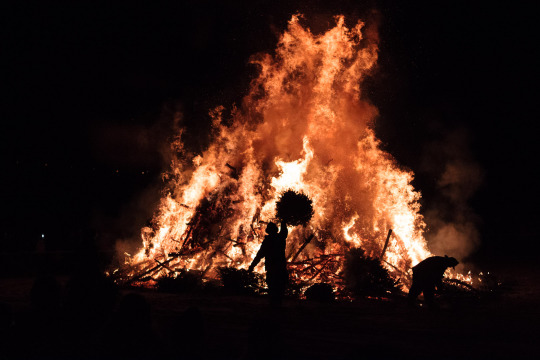
10:10 PM (Approx.) - The recitation of the Quileute traditions ends; Bella dozes off next to Jacob
11:45 PM (Approx.) - Jake wakes Bella up, having already called Edward and driven her to the treaty line
11:48 PM (Approx.) - Bella rejoins Edward on his side of the line
#twilight saga#twilight renaissance#bella swan#jacob black#twilight wolf pack#twilight wolves#billy black#edward cullen#real time twilight#eclipse in real time 🧣#eclipse 🧣#eclipse twilight#twilight saga: eclipse
4 notes
·
View notes
Text
Dragon ball z kai the final chapters dub


He has been critically acclaimed for his work Between Clay and Dust and The Story of a Widow. He has translated many Urdu novels and books of poetry including, The Adventures of Amir Hamza, Tilism-e Hoshruba, Numberdar ka Neela, and Selected Poetry of Afzal Ahmed Syed.īorn in Pakistan, Javeri is a graduate of the University of Oxford and has a PhD from the University of Leicester. He has written seven fiction novels in both Urdu and English. Her novels include The End of Innocence, Duty Free, and The Diary of a Social Butterfly.ġ0. Musharraf Ali Farooqi source: īorn in Hyderabad, Pakistan, Farooqi is an author, storyteller, and folklorist, and the founder and editor of the Urdu Thesaurus. She returned to Pakistan years later and founded the country’s first nature magazine. His novel series, Agency Rules, is a journey behind the headlines about Pakistan, questioning everything that has been said about the country, its people, and the challenges it faces.īorn and raised in Lahore, she left Pakistan at the age of 16 to attend boarding school in England and later attended Cambridge University. He’s a business executive running a marketing and brand management company by day and a writer by night. Khalid Muhammad source: īorn in Swat Valley and raised in the US, Muhammad moved back to Pakistan and fell in love with the country. Nadeem Aslam source: īorn in Pakistan in 1966 and moving to the UK as a teenager, Aslam left Biochemistry to become a writer. His first novel, Season of the Rainbirds, won a Betty Trask Award and the Authors’ Club First Novel Award. His second novel, Maps for Lost Lovers, which took 11 years to write, won the 2005 Encore Award and the 2005 Kiriyama Pacific Rim Book Prize. A God in Every Stone was shortlisted for the 2015 Walter Scott Prize and the Baileys Women’s Prize For Fiction. She has also written a non-fiction novel, Offence: The Muslim Case.ħ. Her four novels: My Feudal Lord, A Mirror to the Blind, Blasphemy, and Happy Things in Sorrow Times have gotten international acclaim.īorn in Karachi, Shamsie is the author of eight novels, including Burnt Shadows, which was shortlisted for the Orange Prize and translated into over 20 languages. Her first book, My Feudal Lord, caused controversy in Pakistan’s society by describing her abusive marriage to Ghulam Mustafa Khar. Tehmina Durrani source: ĭurrani is a Pakistani women’s rights activist and author. His short-story collection In Other Rooms, Other Wonders, has been translated into sixteen languages and won The Story Prize, the Commonwealth Writers’ Prize and other honors and critical acclaim.ĥ. Daniyal Mueenuddin source: īorn in Los Angeles and raised in Pakistan, Mueenuddin studied at Dartmouth and Yale Law School. The writer acknowledges the difficulties and injustices and are always set in Pakistan.Ĥ. Hanif has written for the stage and screen. Mohammad Hanif source: īorn in Okara, Hanif is a critically acclaimed author of three novels, A Case of Exploding Mangoes, Our Lady of Alice Bhatti, and The Baloch Who Is Not Missing And Others Who Are. Grown up with polio, she is Pakistan’s leading diasporic writer and has produced four novels in English that reflect her personal experience of the subcontinent’s Partition, abuse against women, immigration to the US, and the Parsi community.ģ. His work has been featured in many different bestseller lists and been translated into over 35 languages.īorn in Karachi, Bapsi Sidhwa is an award-winning Pakistani novelist. Mohsin Hamid source: īorn in Lahore, is the author of four novels, Moth Smoke, The Reluctant Fundamentalist, How to Get Filthy Rich in Rising Asia, and Exit West, and a book of essays, Discontent and Its Civilizations. Here are 11 Pakistani authors who have gotten international acclaim for their beautiful work. These Pakistani writers have proved that this nation is filled with treasuring stories that are not just about the war on terror.

With Pakistan Day this weekend, it’s the perfect opportunity to celebrate our literary heroes who have made us proud all around the world with their touching stories and creativity.

0 notes
Link
0 notes
Text
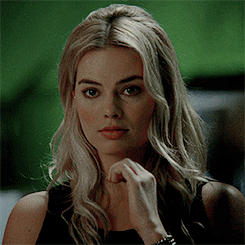
"Who cares?... Oh, wait. Not me"
Alice Dartmouth
Fandom: The Vampire Diaries
Played by: Margot Robbie
Book: Ripper
Available only in Wattpad. @Deya0302
#originalcharacter#vampire#wattpad#oc#mystic falls#Alice Dartmouth#stefan salvatore#vampire diaries#wattpadbook#Humanity switch#Ripper#Vampire ripper
5 notes
·
View notes
Photo
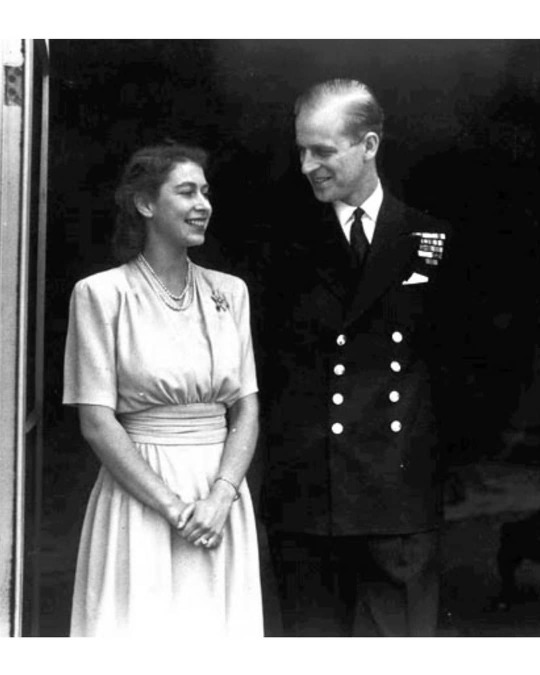
#otd 9 July 1947 - Princess Elizabeth (now Queen Elizabeth II) & Philip Mountbatten officially announce their engagement.
.
❤️ Elizabeth & Philip are second cousins once removed (by descent from Christian IX of Denmark & Louise of Hesse-Kassel) & third cousins (by descent from Queen Victoria & Prince Albert).
.
Princess Elizabeth met Prince Philip in 1934, at the wedding of Philip’s cousin Princess Marina of Greece and Denmark to Prince George, Duke of Kent, paternal uncle of Elizabeth, & again in 1937. After another meeting at the Royal Naval College in Dartmouth in July 1939, Elizabeth—though only 13 years old—fell in love with Philip & they began to exchange letters.
.
The couple became secretly engaged in 1946, when Philip asked King George VI for his daughter’s hand in marriage. The King granted his request providing any formal engagement was delayed until Elizabeth’s 21st birthday the following April. Their engagement was officially announced on 9 July 1947.
.
Philip proposed to Elizabeth with a 3-carat round diamond ring consisting of “a centre stone flanked by 10 smaller pave diamonds." The diamonds were taken from a tiara that belonged to Philip’s mother, Princess Alice of Battenberg, & were also used to create a quatrefoil bracelet for Elizabeth.
.
The King gave his formal consent to the marriage in his British Privy Council, in accordance with the Royal Marriages Act 1772. The same was done in Canada at a meeting of the King’s Canadian Privy Council, with the Chief Justice of Canada, Thibaudeau Rinfret, standing in as deputy to the King’s representative, the Governor General of Canada
.
They married on 20 November 1947 at Westminster Abbey.
.
.
.
#britishroyalty #britishmonarchy #hermajestythequeen #thequeen #monarchy #godsavethequeen #hermajesty #britishroyals #queenelizabeth #Royalty #Royals #queenelizabethii #d9jul #thecrown #elizabethii #houseofwindsor #windsorcastle #britishroyalfamily #Monarchy #queenelizabeth2 #royalfamily #ukroyals #BritishQueen #royalblog #Monarch #BuckinghamPalace #PrincePhilip #Dukeofedinburgh #PrincePhilipDukeofEdinburgh (at Windsor Castle)
https://www.instagram.com/p/CRHU-AQsFC3/?utm_medium=tumblr
#otd#britishroyalty#britishmonarchy#hermajestythequeen#thequeen#monarchy#godsavethequeen#hermajesty#britishroyals#queenelizabeth#royalty#royals#queenelizabethii#d9jul#thecrown#elizabethii#houseofwindsor#windsorcastle#britishroyalfamily#queenelizabeth2#royalfamily#ukroyals#britishqueen#royalblog#monarch#buckinghampalace#princephilip#dukeofedinburgh#princephilipdukeofedinburgh
31 notes
·
View notes
Text

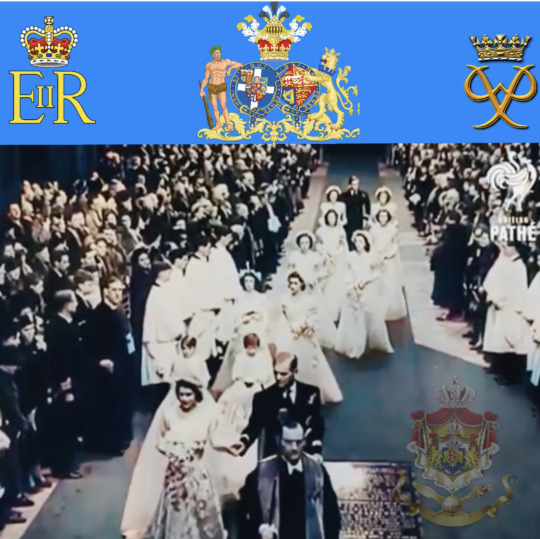
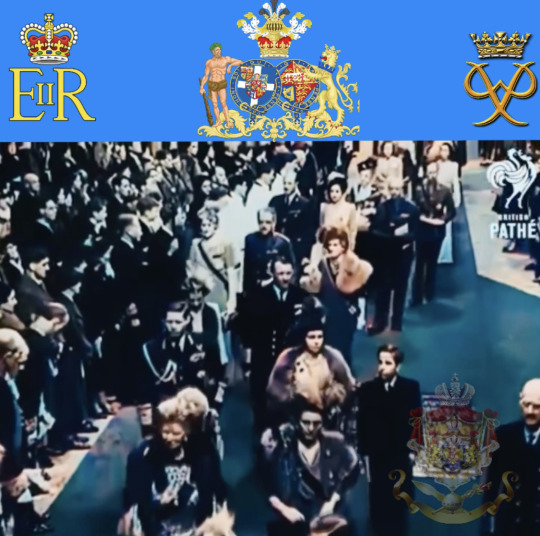
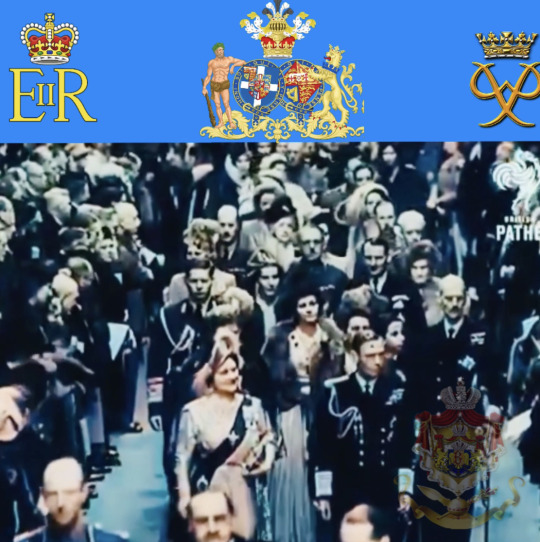



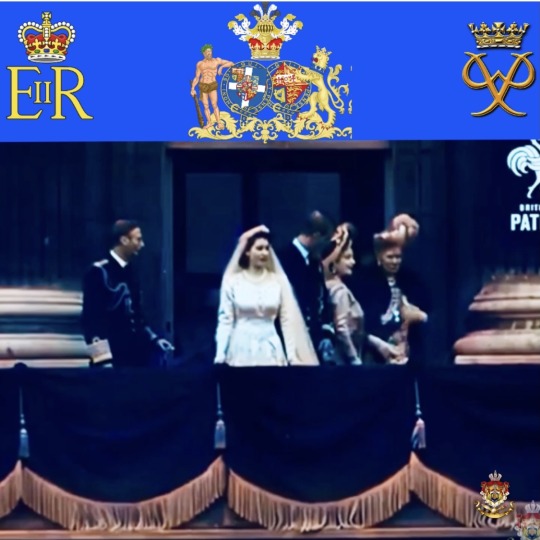
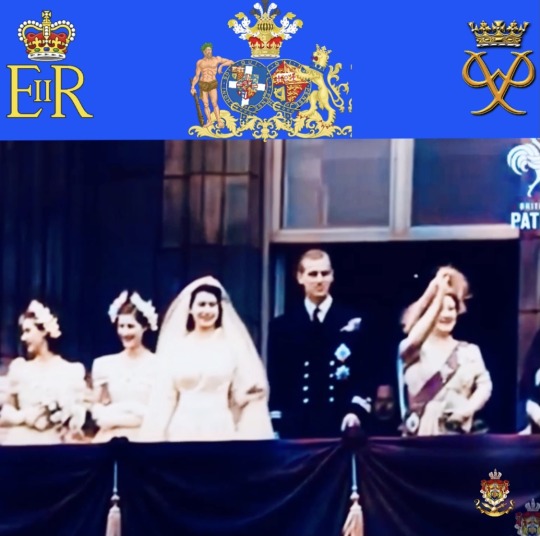

74 years since the wedding of HM Queen Elizabeth II of UK to HRH Prince Philipp Duke of Edinburg née Prince of Greece and Denmark
The wedding of Princess Elizabeth and Philip Mountbatten took place on 20 November 1947 at Westminster Abbey in London, United Kingdom. The bride was the elder daughter of King George VI and heir presumptive to the British throne. The groom was a former Greek and Danish prince. Philip had been made Duke of Edinburgh, Earl of Merioneth and Baron Greenwich on the morning of the wedding
Elizabeth and Philip are second cousins once removed (by descent from Christian IX of Denmark and Louise of Hesse-Kassel) and third cousins (by descent from Queen Victoria and Prince Albert). Princess Elizabeth met Prince Philip in 1934, at the wedding of Philip's cousin Princess Marina of Greece and Denmark to Prince George, Duke of Kent, paternal uncle of Elizabeth, and again in 1937. After another meeting at the Royal Naval College in Dartmouth in July 1939, Elizabeth—though only 13 years old—fell in love with Philip and they began to exchange letters. An entry in Chips Channon's diary made reference to the future marriage of Elizabeth and Philip as early as 1941, "He is to be our Prince Consort, and that is why he is serving in our Navy. The couple became secretly engaged in 1946, when Philip asked King George VI for his daughter's hand in marriage. The King granted his request providing any formal engagement was delayed until Elizabeth's 21st birthday the following April. Their engagement was officially announced on 9 July 1947. Philip proposed to Elizabeth with a 3-carat round diamond ring consisting of "a centre stone flanked by 10 smaller pave diamonds." The diamonds were taken from a tiara that belonged to Philip's mother, Princess Alice of Battenberg, and were also used to create a quatrefoil bracelet for Elizabeth.
The King gave his formal consent to the marriage in his British Privy Council, in accordance with the Royal Marriages Act 1772. The same was done in Canada at a meeting of the King's Canadian Privy Council, with the Chief Justice of Canada, Thibaudeau Rinfret, standing in as deputy to the King's representative, the Governor General of Canada.
Before the wedding, Philip renounced his Greek and Danish titles, converted from Greek Orthodoxy to Anglicanism and adopted the style "Lieutenant Philip Mountbatten", taking the surname of his mother's British family. The day before the wedding, King George bestowed the style "Royal Highness" and, on the morning of the wedding, 20 November 1947, he was made the Duke of Edinburgh, Earl of Merioneth, and Baron Greenwich of Greenwich in the County of London. Consequently, being already a Knight of the Garter, between 19 and 20 November 1947 he bore the unusual style His Royal Highness Sir Philip Mountbatten and is so described in the Letters Patent of 20 November 1947.
Upon their marriage, Elizabeth took the title of her husband and became Princess Elizabeth, Duchess of Edinburgh.
The King and Queen of the United Kingdom, the bride's parents
The Princess Margaret, the bride's sister
Queen Mary of the United Kingdom, the bride's paternal grandmother
The Duke and Duchess of Gloucester, the bride's paternal uncle and aunt
Prince William of Gloucester, the bride's first cousin
Prince Richard of Gloucester, the bride's first cousin
The Duchess of Kent, the bride's paternal aunt by marriage (and the groom's first cousin)
The Duke of Kent, the bride's first cousin
Princess Alexandra of Kent, the bride's first cousin
Prince Michael of Kent, the bride's first cousin
The Princess Royal's family:
The Earl of Harewood, the bride's first cousin
The Hon. Gerald Lascelles, the bride's first cousin
The Earl of Southesk, widower of the bride's first cousin once removed
Lord Carnegie, the bride's second cousin
Princess Helena Victoria, the bride's and the groom's first cousin twice removed
Princess Marie Louise, the bride's and the groom's first cousin twice removed
Lady Patricia and The Hon. Sir Alexander Ramsay, the bride's and the groom's first cousin twice removed and her husband
Alexander Ramsay of Mar, the bride's and the groom's second cousin once removed
The Earl of Athlone and Princess Alice, Countess of Athlone, the bride's paternal great-uncle and great-aunt (also first cousin once removed to the bride and groom)
Lady May and Henry Abel Smith, the bride's first cousin once removed and her husband
Miss Anne Abel Smith, the bride's second cousin
Miss Elizabeth Abel Smith, the bride's second cousin
The Marquess and Marchioness of Cambridge, the bride's first cousin once removed and his wife
Lady Mary Cambridge, the bride's second cousin
The Duchess and Duke of Beaufort, the bride's first cousin once removed and her husband
Lady Helena Gibbs, the bride's first cousin once removed
Lady and Lord Elphinstone, the bride's maternal aunt and uncle
The Master of Elphinstone, the bride's first cousin
The Hon. Mrs. Jean Wills and Mr. John Wills, the bride's first cousin and her husband
The Hon. Mr. and Mrs. Andrew Elphinstone, the bride's first cousin and his wife
The Hon. Miss Margaret Elphinstone, the bride's first cousin
The Earl of Strathmore and Kinghorne, the bride's maternal uncle
The Hon. Mrs. John Bowes-Lyon, the bride's maternal aunt by marriage
Viscountess Anson, the bride's first cousin
Diana Bowes-Lyon, the bride's first cousin
The Countess and Earl Granville, the bride's maternal aunt and uncle
Lady Mary Leveson-Gower, the bride's first cousin
Lord Leveson, the bride's first cousin
The Hon. Mr. and Mrs. Michael Bowes-Lyon, the bride's maternal uncle and aunt
The Hon. Mr. and Mrs. David Bowes-Lyon, the bride's maternal uncle and aunt
Groom's family
Princess Andrew of Greece and Denmark, the groom's mother
The Dowager Marchioness of Milford Haven, the groom's maternal grandmother
The Crown Princess and Crown Prince of Sweden, the groom's maternal aunt and uncle (representing King Gustav V)
The Marchioness of Milford Haven, the groom's maternal aunt by marriage
Lady Tatiana Mountbatten, the groom's first cousin
The Marquess of Milford Haven, the groom's first cousin
The Earl and Countess Mountbatten of Burma, the groom's maternal uncle and aunt
Lady and Lord Brabourne, the groom's first cousin and her husband
Lady Pamela Mountbatten, the groom's first cousin
The Queen and King of Yugoslavia, the groom's first cousin, once removed, and her husband
The Queen Mother of the Romanians, the groom's first cousin
The King of the Romanians, the groom's first cousin, once removed
The Queen of the Hellenes, wife of the groom's first cousin (representing the King of the Hellenes)
The Duchess of Aosta, the groom's first cousin
Princess Katherine of Greece and Denmark and Major Richard Brandram, the groom's first cousin and her husband
Prince and Princess George of Greece and Denmark, the groom's paternal uncle and aunt
Princess Dominic Radziwiłł, the groom's first cousin
The King and Queen of Denmark, the groom's second cousin and his wife
The King of Norway, the groom's first cousin, once removed and the bride's paternal great-uncle by marriage
Princess Axel of Denmark, wife of the groom's first cousin, once removed
Prince George Valdemar of Denmark, the groom's second cousin
Prince Flemming Valdemar of Denmark, the groom's second cousin
Princess and Prince René of Bourbon-Parma, the groom's first cousin, once removed and her husband
Princess Anne of Bourbon-Parma, the groom's second cousin
Prince Michel of Bourbon-Parma, the groom's second cousin
The Marquess and Marchioness of Carisbrooke, the groom's first cousin once removed and the bride's first cousin twice removed, and his wife
Queen Victoria Eugenie of Spain, the groom's first cousin, once removed and the bride's first cousin twice removed
The Count and Countess of Barcelona, the groom's second cousin and his wife
The Hereditary Grand Duke of Luxembourg, the groom's third cousin, once removed (representing the Grand Duchess of Luxembourg)
Princess Elisabeth of Luxembourg, the groom's third cousin, once removed
Prince Tomislav of Yugoslavia
Prince Andrew of Yugoslavia
The Prince Regent of Belgium (representing the King of the Belgians)
Princess Juliana and Prince Bernhard of the Netherlands (representing the Queen of the Netherlands)
The King of Iraq
The Duke of Windsor, the former king, was not invited, and his sister, Mary, Princess Royal, did not attend as she said she was ill (her husband, Henry Lascelles, 6th Earl of Harewood, had died six months before). Ronald Storrs claimed that the Princess Royal did not attend in protest over her brother's exclusion. So soon after the end of World War II, it was not acceptable for the Duke of Edinburgh's German relations, including Philip's three surviving sisters, to be invited to the wedding.
74 χρόνια από τον γάμο της ΑΜ Ελισσαβετ Β’ του ΗΒ και της ΑΒΥ Πρίγκιπα Φιλίππου του ΗΒ Δούκα του Εδιμβούργου πρώην Πρίγκιπα της Ελλάδος και Δανίας
Ο γάμος της πριγκίπισσας Ελισαβετ και του Πρίγκιπα Φιλίππου πραγματοποιήθηκε στις 20 Νοεμβρίου 1947 στο Westminster Abbey του Λονδίνου στο Ηνωμένο Βασίλειο. Η νύφη ήταν η μεγαλύτερη κόρη του βασιλιά Γεωργίου ΣΤ' και διάδοχος του βρετανικού θρόνου. Ο γαμπρός ήταν ο Φιλιππος πρώην πρίγκιπας της Ελλαδας και Δανίας Που είχε γίνει δούκας του Εδιμβούργου, κόμης της Μεριόνεθ και βαρόνος Γκρίνουιτς το πρωί του γάμου.
Η Ελισάβετ και ο Φίλιππος είναι δεύτερα ξαδέρφια (καταγωγή από τον Κρίστιαν Θ' της Δανίας και τη Λουίζα της Έσσης-Κάσσελ) και τρίτα ξαδέρφια (καταγωγή από τη βασίλισσα Βικτώρια και τον πρίγκιπα Αλβέρτο). Η πριγκίπισσα Ελισάβετ γνώρισε τον πρίγκιπα Φίλιππο το 1934, στον γάμο της ξαδέρφης του Φιλίππου, Πριγκίπισσας Μαρίνας της Ελλάδας και της Δανίας με τον πρίγκιπα Γεώργιο, δούκα του Κεντ, θείο της Ελισάβετ από τον πατέρα, και ξανά το 1937. Μετά από μια άλλη συνάντηση στο Βασιλικό Ναυτικό Κολλέγιο στο Ντάρτμουθ τον Ιούλιο Το 1939, η Ελίζαμπεθ —αν και μόλις 13 ετών— ερωτεύτηκε τον Φίλιππο και άρχισαν να ανταλλάσσουν γράμματα. Μια καταχώριση στο ημερολόγιο του Chips Channon έκανε αναφορά στον μελλοντικό γάμο της Ελισάβετ και του Φίλιππου ήδη από το 1941, "Πρέπει να είναι ο Πρίγκιπας μας, και γι' αυτό υπηρετεί στο ναυτικό μας.
Το ζευγάρι αρραβωνιάστηκε κρυφά το 1946, όταν Ο Φίλιππος ζήτησε από τον βασιλιά Γεώργιο ΣΤ' το χέρι της κόρης του. Ο Βασιλιάς αποδέχθηκε το αίτημά του, εφόσον ο επίσημος αρραβώνας καθυστέρουσε μέχρι τα 21α γενέθλια της Ελισάβετ τον επόμενο Απρίλιο. Ο αρραβώνας τους ανακοινώθηκε επίσημα στις 9 Ιουλίου 1947. Ο Φίλιππος έκανε πρόταση γάμου στην Ελισάβετ με ένα 3 καρατίων στρογγυλό διαμαντένιο δαχτυλίδι που αποτελείται από "μια κεντρική πέτρα που πλαισιώνεται από 10 μικρότερα πλακόστρωτα διαμάντια." Τα διαμάντια ελήφθησαν από μια τιάρα που ανήκε στη μητέρα του Φιλίππου, την πριγκίπισσα Αλίκη της Ελλαδας Δανιας και Εδινβουργου και χρησιμοποιήθηκαν επίσης για τη δημιουργία ενός τετράφυλλου βραχιολιού για την Ελισάβετ.
Ο Βασιλιάς έδωσε την επίσημη συγκατάθεσή του για το γάμο στο Βρετανικό Μυστικό Συμβούλιο του, σύμφωνα με τον νόμο περί βασιλικών γάμων του 1772. Το ίδιο έγινε στον Καναδά σε μια συνεδρίαση του Καναδικού Συμβουλίου Μυστικών του Βασιλιά, με τον Ανώτατο Δικαστήριο του Καναδά, Thibaudeau Rinfret, ως αναπληρωτής του αντιπροσώπου του Βασιλιά, του Γενικού Κυβερνήτη του Καναδά.
Πριν από το γάμο, ο Φίλιππος απαρνήθηκε τον ελληνικό και τον δανικό τίτλο του, μετατράπηκε από την ελληνορθοδοξία στον αγγλικανισμό και υιοθέτησε το «Υπολοχαγός Philip Mountbatten», παίρνοντας το επίθετο της βρετανικής οικογένειας της μητέρας του. Την ημέρα πριν από το γάμο, ο Βασιλιάς Γεώργιος απένειμε το Βασιλική Υψηλότητα» και, το πρωί του γάμου, στις 20 Νοεμβρίου 1947, έγινε Δούκας του Εδιμβούργου, κόμης της Μεριόνεθ και βαρόνος Γκρίνουιτς του Γκρίνουιτς στην Κομητεία του Λονδίνου. . Ως εκ τούτου, όντας ήδη Ιππότης της Καλτσοδέτας, μεταξύ 19 και 20 Νοεμβρίου 1947 έφερε το ασυνήθιστο τίτλο της Αυτού Βασιλικής Υψηλότητας Sir Philip Mountbatten και περιγράφεται έτσι στην Ευρεσιτεχνία Επιστολών της 20ης Νοεμβρίου 1947.
Μετά το γάμο τους, η Ελισάβετ πήρε τον τίτλο του συζύγου της και έγινε πριγκίπισσα Ελισάβετ, Δούκισσα του Εδιμβούργου.
Οι Συγγενείς της Νύφης
Ο βασιλιάς και η βασίλισσα του Ηνωμένου Βασιλείου, οι γονείς της νύφης
Η πριγκίπισσα Μαργαρίτα, η αδερφή της νύφης
Η βασίλισσα Μαρία του Ηνωμένου Βασιλείου, η γιαγιά της νύφης από τον πατέρα
Ο Δούκας και η Δούκισσα του Γκλόστερ, ο θείος και η θεία της νύφης από τον πατέρα
Ο πρίγκιπας Γουίλιαμ του Γκλόστερ, ο πρώτος ξάδερφος της νύφης
Ο πρίγκιπας Ριχάρδος του Γκλόστερ, ο πρώτος ξάδερφος της νύφης
Η Δούκισσα του Κεντ, η θεία της νύφης από τον πατέρα (και η πρώτη ξαδέρφη του γαμπρού)
Ο Δούκας του Κεντ, ο πρώτος ξάδερφος της νύφης
Η πριγκίπισσα Αλεξάνδρα του Κεντ, η πρώτη ξαδέρφη της νύφης
Ο Πρίγκιπας Μιχαήλ του Κεντ, ο πρώτος ξάδερφος της νύφης
Ο κόμης του Χάργουντ, ο πρώτος ξάδερφος της νύφης
Ο Hon. Gerald Lascelles, ο πρώτος ξάδερφος της νύφης
Ο κόμης του Southesk, χήρος της πρώτης ξαδέρφης της νύφης
Ο Λόρδος Κάρνεγκι, ο δεύτερος ξάδερφος της νύφης
Η πριγκίπισσα Helena Victoria, η πρώτη ξαδέρφη της νύφης και του γαμπρού
Η πριγκίπισσα Μαρία Λουίζα, η πρώτη ξαδέρφη της νύφης και του γαμπρού
Lady Patricia and Ο Hon. Sir Alexander Ramsay, πρώτη ξάδερφη της νύφης και του γαμπρού και ο σύζυγός της
Ο Alexander Ramsay του Mar, ο δεύτερος ξάδερφος της νύφης και του γαμπρού
Ο κόμης του Άθλον και η πριγκίπισσα Αλίκη, η κόμισσα του Άθλον, ο προπάππους και η προγιαγιά της νύφης από τον πατέρα (επίσης πρώτος ξάδερφος της νύφης και του γαμπρού )
Η λαίδη Μέι και ο Χένρι Άμπελ Σμιθ, ο πρώτος ξάδερφος της νύφης και ο σύζυγός της
Η μις Αν Άμπελ Σμιθ, η δεύτερη ξαδέρφη της νύφης
Η δεσποινίς Ελίζαμπεθ Άμπελ Σμιθ, η δεύτερη ξαδέρφη της νύφης
Η μαρκήσια και η Μαρκησιος του Κέιμπριτζ, η πρώτη ξαδέρφη της νύφης και η γυναίκα του
Lady Mary Cambridge, η δεύτερη ξαδέρφη της νύφης
Η Δούκισσα και Δούκας του Μποφόρ, ο πρώτος ξάδερφος της νύφης και ο σύζυγός της
Η λαίδη Έλενα Γκιμπς, η πρώτη ξαδέρφη της νύφης
Η Λαίδη και ο Λόρδος Έλφινστοουν, η θεία και ο θείος της νύφης
Ο Master of Elphinstone, ο πρώτος ξάδερφος της νύφης
Η κυρία Jean Wills και ο κύριος John Wills, ο πρώτος ξάδερφος της νύφης και ο σύζυγός της
Ο κύριος και η κυρία Andrew Elphinstone, ο πρώτος ξάδερφος της νύφης και η γυναίκα του
Η δεσποινίς Margaret Elphinstone, η πρώτη ξαδέρφη της νύφης
Ο κόμης του Στράθμορ και ο Κίνγκχορν, ο θείος της νύφης από τη μητέρα
Η κυρία John Bowes-Lyon, θεία της νύφης από τον γάμο
Η Viscountess Anson, η πρώτη ξαδέρφη της νύφης
Diana Bowes-Lyon, η πρώτη ξαδέρφη της νύφης
Η κόμισσα και ο κόμης Γκράνβιλ, η θεία και ο θείος της νύφης
Η λαίδη Mary Leveson-Gower, η πρώτη ξαδέρφη της νύφης
Ο Λόρδος Λέβεσον, ο πρώτος ξάδερφος της νύφης
Ο κύριος και η κυρία Michael Bowes-Lyon, ο θείος και η θεία της νύφης από τη μητέρα
Ο κύριος και η κυρία David Bowes-Lyon, ο θείος και η θεία της νύφης από τη μητέρα
Η οικογένεια του γαμπρού
ΗΠριγκίπισσα Αλικη της Ελλάδας Δανίας, και Μπατενμπεργκ μητέρα του γαμπρού
Η Χήρα Μαρκησία του Milford Haven, η γιαγιά του γαμπρού από τη μητέρα
Η διάδοχος και ο διάδοχος της Σουηδίας, η θεία και ο θείος του γαμπρού (που εκπροσωπεί τον βασιλιά Γουσταύο Ε')
Η Μαρκησία του Μίλφορντ Χέιβεν, η θεία του γαμπρού εξ αγχιστείας
Η λαίδη Τατιάνα Μαουντμπάτεν, η πρώτη ξαδέρφη του γαμπρού
Η μαρκήσια του Μίλφορντ Χέιβεν, η πρώτη ξαδέρφη του γαμπρού
Ο κόμης και η κόμισσα Μάουντμπατέν της Βιρμανίας, ο θείος και η θεία του γαμπρού
Η Λαίδη και ο Λόρδος Μπράμπουρν, η πρώτη ξαδέρφη του γαμπρού και ο σύζυγός της
Η λαίδη Πάμελα Μαουντμπάτεν, η πρώτη ξαδέρφη του γαμπρού
Η βασίλισσα και ο βασιλιάς της Γιουγκοσλαβίας, ο πρώτος ξάδερφος του γαμπρού, και ο σύζυγός της
Η Βασίλισσα Μητέρα των Ρουμάνων, η πρώτη ξαδέρφη του γαμπρού
Ο Βασιλιάς των Ρουμάνων, ο πρώτος ξάδερφος του γαμπρού,
Η Βασίλισσα των Ελλήνων, σύζυγος του πρώτου ξαδέλφου του γαμπρού (που εκπροσωπεί τον Βασιλιά των Ελλήνων)
Η Δούκισσα της Αόστα, η πρώτη ξαδέρφη του γαμπρού
Πριγκίπισσα Αικατερίνη της Ελλάδας και της Δανίας και ο Ταγματάρχης Ρίτσαρντ Μπράντραμ, ο πρώτος ξάδερφος του γαμπρού και ο σύζυγός της
Πρίγκιπας και πριγκίπισσα Γεώργιος και Μαρια (Βοναπάρτη )της Ελλάδας και της Δανίας, ο θείος και η θεία του γαμπρού
Η πριγκίπισσα Dominic Radziwiłł, η πρώτη ξαδέρφη του γαμπρού
Ο βασιλιάς και η βασίλισσα της Δανίας, ο δεύτερος ξάδερφος του γαμπρού και η γυναίκα του
Ο βασιλιάς της Νορβηγίας, ο πρώτος ξάδερφος του γαμπρού,
Η πριγκίπισσα Άξελ της Δανίας, σύζυγος του πρώτου ξαδέλφου του γαμπρού,
Ο πρίγκιπας Γεώργιος Βλαδίμηρος της Δανίας, δεύτερος ξάδερφος του γαμπρού
Πρίγκιπας Φλέμινγκ Βλαδίμηρος της Δανίας, δεύτερος ξάδερφος του γαμπρού
Η πριγκίπισσα και ο πρίγκιπας Ρενέ των Bourbon-Parma, ο πρώτος ξάδερφος του γαμπρού, και ο σύζυγός της
Πριγκίπισσα Άννα των Μπουρμπόν-Πάρμα, δεύτερη ξαδέρφη του γαμπρού
Πρίγκιπας Michel of Bourbon-Parma, ο δεύτερος ξάδερφος του γαμπρού
Η μαρκήσια και η Μαρκισιος του Carisbrooke, ο πρώτος ξάδερφος του γαμπρού και πρώτος ξάδερφος της νύφης και η γυναίκα του
Η βασίλισσα Βικτωρια Ευγενία της Ισπανίας, η πρώτη ξαδέρφη του γαμπρού, πρώτη ξαδέρφη της νύφης
Ο Κόμης και η Κόμισσα της Βαρκελώνης, ο δεύτερος ξάδερφος του γαμπρού και η γυναίκα του
Ο Μέγας Δούκας του Λουξεμβούργου, ο τρίτος ξάδερφος του γαμπρού, (που αντιπροσωπεύει τη Μεγάλη Δούκισσα του Λουξεμβούργου)
Η πριγκίπισσα Ελισάβετ του Λουξεμβούργου, η τρίτη ξαδέρφη του γαμπρού,
Πρίγκιπας Τόμισλαβ της Γιουγκοσλαβίας
Πρίγκιπας Ανδρέας της Γιουγκοσλαβίας
Ο Πρίγκιπας Αντιβασιλέας του Βελγίου (που εκπροσωπεί τον Βασιλιά των Βελγών)
Η πριγκίπισσα Juliana και ο πρίγκιπας Bernhard της Ολλανδίας (που εκπροσωπεί τη βασίλισσα της Ολλανδίας)
Ο Βασιλιάς του Ιράκ
Ο Δούκας του Ουίνδσορ, ο πρώην βασιλιάς, δεν προσκλήθηκε και η αδερφή του, η Μαρία, η πριγκίπισσα Ρόγιαλ, δεν παρευρέθηκε καθώς είπε ότι ήταν άρρωστη (ο σύζυγός της, Ερρίκος Λασκέλες, 6ος κόμης του Χάργουντ, είχε πεθάνει έξι μήνες πριν). Ο Ρόναλντ Στορς ισχυρίστηκε ότι η πριγκίπισσα Βασιλική δεν παρευρέθηκε σε ένδειξη διαμαρτυρίας για τον αποκλεισμό του αδελφού της. Έτσι, αμέσως μετά το τέλος του Β' Παγκοσμίου Πολέμου, δεν ήταν αποδεκτό οι Γερμανοί συγγενείς του Δούκα του Εδιμβούργου, συμπεριλαμβανομένων των τριών επιζώντων αδελφών του Φίλιππου, που είχαν παντρευτεί και οι τρεις Γερμανους Πριγκιπες να προσκληθούν στον γάμο.
#kingconstantine#danishroyalfamily#crownprincepavlos#queenannemarie#greek royal family#house of romanov#greekroyals#crownprincessmariechantal#danishroyals#princeconstantinealexios#princess theodora#princessmarieolympia#princeachileasandreas#princenikolaos#princesstatiana#princessalexia#princessnina#princesseirini#princearistidesstavros#princeodyseaskimon#princefilippos
9 notes
·
View notes
Text
Riverdale S4 E9 (Spoilers!)
- An episode in which the main four pursue entirely separate lives and don’t overlap a single time.
Veronica
- Dartmouth was my safety school. I get such a kick out of Veronica Lodge constantly uttering ultimate flexes in this casual way. The Columbia U recruiter comes to watch Veronica in action, and gets an absolute eyeful. Hiram sneers at The Underage Party Girl Veronica Luna, but he is missing the point. Apparently, Columbia is looking for people with good stories, and Veronica is supposed to tell the story of how she ended up where she is, which means she has to do an elevator speech or maybe a TED talk summarizing the Lodge parts of Riverdale, yet without confessing to the many crimes of Hermione, Hiram, Hermosa and Veronica. Wow, that is a hard task. Impossible, even. No wonder they cut away! And what to do with the implication that the recruiter lady is turned on by Veronica’s sexy song and dance performance? Oh and by the way, Reggie is at the Speak Easy helping out, looking subdued and depressed.
- Mayor Hiram obtains an injunction to retract the liquor license for the Diner, and Veronica is the best legal thinker in town, because she resourcefully says, “We are fighting this injunction.” (See, Mary, this is how you do it.)
- Rum, Abuelita, Godmother. Veronica involves her grandmother to fight her father for the rum, and her use of nomenclature is fascinating. She meets her grandmother on an abuelita basis, but when she wants to bring said abuelita on her side in this business dispute she has going on with her dad, she calls her godmother. I enjoyed the fact that Hiram is afraid of his mother, who smacks him for competing with his daughter, her godchild. Interesting family dynamics there, done in efficient writing. Well done! But after going through two seasons about real estate, the Lodge intra-family dispute now involves patent litigation, cease and desist letters and so on, about the ingredients of rum, and it’s starting to sag once more. Where is Hermosa?
Alice, Polly, Evelyn and Betty
- Polly scraped someone’s face off at Shady Grove, the face of a Betty. Betty is so noble and brave, because she goes to see her sister, but Polly is tied down and it’s so sad to look at but she can’t remember anything. God, Polly is such a tragic character.
- Then Alice attacks Betty with a knife after getting a call, and the way to snap her out of it is literally to snap your fingers. When I first saw this, I assumed that the prompt was Kill the Person You Think Ruined Your Life, and that Polly and Alice were united in their conviction that everything was Betty’s fault. And again, the sheer brains of Betty Cooper, to deal with the problem as and when rather than run off screaming and crying in hysterics (which is what I would do) The magic phrase is Tangerine, three times. Charles wants Betty to try it out when it’s just him & her. I thought that Charles was being really brave, but then I remembered that Charles doesn’t know about the 5+ times that Betty has walloped someone on the back of the head and sent them into the beyond.
- Betty has all these women obsessed with her - Veronica, yes, but also Polly, Alice, and now Evelyn. I think Evelyn is lying when she says that this auditory hypnotic trick (”They become Betty and kill Other Betty”) was Edgar’s idea. It’s got to be Evelyn’s idea. Betty Cooper absolutely does not have suicidal ideation or a self destructive urge in her body. Betty Cooper is all about forward movement, regardless. Denial is not the same thing as destruction.
- Betty manages to heal her childhood self by doing a version of actual real-life therapy where you enact the thing you wish had happened instead of the bad thing that actually did happen - she rescues her child self from having to murder her cat. But then Betty breaks the mirror after saying Tangerine to herself, and the show ties it to the fake out of Jughead’s death.
Archie Ruins FP
- Sheriff FP is investigating a vigilante, so goes straight to Archie, and Archie just admits to it. In the gratitude and guilt that FP continues to feel for Fred Andrews and the way that Fred kept an eye out for Jughead, FP ends up getting roped into the spiral of violence that is Archie Andrews. Archie is infectious. Further, you know how Toni sneered at Betty back in the day about Northsiders and your privilege? That privilege is in action right here. If it had been Sweet Pea (obligatory longing for Sweet Pea is my vice, bear with me) that needed to avenge a father/brother/uncle, would FP have done this? Of course not!!
- FP installs a metal detector and stuff at the center to beef it up, and tells Archie to focus on the center, and Archie says in essence, I NEED TO KILL A RANDO TO AVENGE MY DAD. Yep. Truth.
- FP is so cute, though, in the same pure-hearted, unable-to-compromise-with-the-dirty-world way that his son is. FP decides to participate in vigilantism, because he doesn’t like being sheriff under Mayor Hiram, and also because he’s been egged on by Alice to revert to his sexier (to her) Serpent persona. Self-destruction for a whackadoo woman is a Jones legacy. The funny part is that FP still thinks the sheriff uniform means something, should mean something, so he puts on his Serpent outfit to do violence. FP and Archie engage in violence, and FP gets shot, because of course he does. FP says he doesn’t regret anything, but this is just more of his commitment to the wrong things.
- FANGS IS HERE. It is so long since we’ve seen the Serpents. What are they all up to while FP is cosplaying being a lawman? Fangs is a better investigator than FP (I mean, everyone is at this point?) and has information on who exactly shot him, within hours of it happening.
- You don’t get to hurt ‘my kids’ and shoot someone in front of me and get to leave without any payback, is what Archie says as he confronts Dodger & family. I think this word choice is very revealing and again, Riverdale has terrific, great writing. The children who come to the Center for food (probably crappy because Archie’s disinterested) and shelter (on the floor, that’s been swept when?) probably don’t think of themselves as being his, for one, and FP is immediately denigrated to being ‘someone’ rather than, A man like a second father to me, or My (best) friend’s father.
- Protagonist Boy Privilege kicks in hardcore for Archie because Dodger has a gun and decides to throw it away in favor of a fistfight. While they are brawling, we are treated to Veronica singing an extremely cheerful song, because Archie is having a wonderful time. Darla, Dodger’s mother who definitely looks at least 5 years younger than him, screams You’ll kill him! and Archie answers I’ll kill all of you. Is this prophetic? Is that how Riverdale will end, with Archie killing everyone?
- Sidebar to note: The ultraviolet light in Sketch Alley is positively luscious. KEVIN who sounds AMAZING is singing with Veronica, and I need to give a demerit to Veronica here, because she’s being vain and not a great business owner to not have Kevin be the headliner. KEVIN’S PIPES ARE TO DIE FOR. If you need to have objectified females, then have them as background dancers, you know? Let Kevin sing.
- You’re not a monster, you’re still hurting. Actually, Archie Andrews hurting AND he’s a monster. (see cf., Jughead, who is hurting all the time and not a monster). Mary is just not bright. Is this supposed to be representation? A nice plain vanilla middle aged woman who is both stupid and a lawyer is indeed a rare creature in television, but why do we need this diversity? The Dickinsons were leaving town and he attacked them, and Archie keeps saying explicitly that he doesn’t understand why Fred had to die, which is not a connection but both Fred and Mary Andrews have an absolute commitment against psychotherapy. Is this some sort of faith based thing?
Jughead
- Jughead enlists Charles to track down “your... uh, our” grandfather. And Charles finds Forsythe Sr right away, and I wonder if FP had already found him and just sat on that information. And Jughead goes to see his grandpa, and his grandfather calls him Boy, same as FP.
- Turns out Jones Sr. sold the first Baxter Bros. story for $5000 because he didn’t know what else to do with it. He doesn’t mean he literally didn’t know, he means he didn’t have the necessary life infrastructure to make that push into risky adulthood. Jones Sr. summarizes his life thusly: Over time he grew bitter, started drinking, took his anger out on the world & on his son, and thought it would be best if he went out for a pack of cigarettes and didn’t come back. In the same strangely ambivalent gesture he’d made of sending Jughead those Baxter Bros books while never actually reaching out to his family, Jones Sr. gives a sort of benediction to Jughead: I messed up my life. You seize the opportunities that you’ve been given.
- Jughead, since matriculating at prep school, has been pondering legacies, and I wonder if people who have in fact messed up their lives should say anything to young people. To suddenly bring a totally heavy duty topic into a Riverdale Recap, I’ve seen obituaries of survivors of atrocities (genocides, wars, incarcerations in camps) who never talked about their experiences with their descendants, because they thought it was enough that they suffered and didn’t want to pass it on to the next generations. The next generations tended to be split about this between understanding that protective urge, and wishing they knew more about their own past. In this fictional narrative of a camp show, I’m of the belief that Jones Sr. should not have told this whole story to Jughead, because in S5, Jughead appears to have grown bitter, started drinking, took his anger out on himself and Betty (via that voicemail), and wanted so much to check out of his own life by going off planet with the aliens.
- Wait, I won the contract? Dupont is a systematic, long-con villain. He is threatened by Jughead’s potential for toppling his book empire, so he decides to corrupt Jughead, softening him up for the killing blow. He’s privilege grooming Jughead, and he does it with a combination of an award tempered with a tiny threat, worded carefully to straddle the line between Did I hear that right? and You’re evil! Jughead gets a contract for his <Case of Boy in the River> and just as he’s about to be really excited about it, Dupont twists the knife with, “As long as you play by the rules.”
- Jughead actually tries to read the contract, which we know has weird Gotcha Clauses in there - like they can take the germ of a story he submits and have other people rewrite it wholesale and not give him credit - but he is interrupted by his task of trying to find his grandfather through Charles. (This is what Burble was talking about - to not try to find his grandfather and focus on his actual work, and he doesn’t!)
- I leave you alone for one day and you get shot. Here goes Jughead parenting his own father again, and it’s because of Archie and neither Jones man can bear to say his name. Jughead updates his father on his grandfather, and then puts words in Jones Sr’s mouth: He knows that he was a bad father. Would you be willing to talk to him if i brought him here? And FP has the same yearning to reconcile with an abusive parent that all children do, even though he is in his 50s, which I find so heartbreaking. This is true for all the abused children in Riverdale: Betty wants to love her mom and have her mother really love her; Cheryl wants to understand the reason, even as she’s clear eyed about what Penelope is doing.
- Of course, Jones Sr. appears to have skipped town again, and Jughead says he feels like a fool, and FP loves Jughead for hoping big for both of them, because Jughead’s optimism and hopefulness is magical. So, Jughead is going to sign the contract but WITHOUT READING IT, first because he’s distracted with all this sleuthing, and secondly, because this is an attempt to let go of the past, and to lay down defensiveness. His signature includes a little crown and it’s so very cute I wanna kiss it.
- Jughead is inducted into the Quill & Skull. Is this the part where you kill me? asks Jughead, to which Bret, looking happier and sounding plummier than ever before, answers No, you ass. That last line delivered with so much love, it positively glows in the dark. These goddamn preppies are in dorky Harry Potter costumes, and they seem to be desecrating an actual human skull, which is so gross, but because this is filmed from Bret’s perspective, they play really pretty music as Bret gazes lovingly at Jughead.
Cheryl v Penelope
- I was born in poison and I shall die in poison. Cheryl gasses out a gaslighter, and out comes Penelope from inside the wall. I feel like Cheryl and Penelope should be singing their lines in operatic notes at each other. Penelope wanted to destroy the happiness Cheryl had with Jason (OK so Cheryl had incestuous feelings about Jason, right So did Penelope??) Penelope’s lines are amazing: You don’t get what I can’t have! and later, Execute me then. She’s the fun, more honest version of Alice.
- Cheryl says, You’re going to a place so vile, so revolting you wish you were bricked up, as a perfect tear rolls down her pretty face. I love Cheryl. And of course I hooted with laughter that this “vile, revolting place” is the Dilton Doiley Bunker, which is gross to Cheryl because so many different boys have had orgasms in this space and there’s no way to air it out properly.
- Has anyone in fandom worked out how the reservation system works for the Bunker?? Are the Serpents running it?
- Cheryl, while crying more of her angelic pre raphaelite tears, decides to finally bury Jason, and it’s gotten to the point where i am just bursting into uncomfortable giggles at the sight of that corpse. The poor actor who gave his likeness for this show , you poor baby. So apparently some combination of like, a Hindu/ viking cremation on a boat on a river is the Blossom way. He was a good brother, I wish you could’ve met him for real.
And finally,
- OH NO HERE COMES UNCLE FRANK. Do not want. Go away. No! Hiss.
- And Jughead is a corpse, and Archie asks Betty, What did you do, Betty, with the same sort of love in his voice that Bret had earlier.
7 notes
·
View notes
Note
If Beau didn't get turned at the end of L&D, do you think that his story would have followed the canon for the most part? For example, New Moon and Eclipse wouldn't change much with just changed genders. What about BD when there's absolutely no chance of a surprise pregnancy? Would Beau and Edyth actually follow through with the canon plan of going to Dartmouth, etc.? If Meyer wrote it, do you think she'd still somehow shoehorn in a miracle baby for them?
Given SM’s writing style I think it probably would have been similar, but Edythe strikes me as somewhat less self-loathing than Edward so it might not be as extreme. There might be a New Moon break-up after a Jessamine incident but I don’t feel like Edythe would need to stage the scene in the woods.
(I mean this still doesn’t make any sense to me. He brings her into the woods, but close enough that they can still see Charlie’s house. Why? Why not break up with her on the front lawn? Or at the kitchen table? Why go into the woods at all, knowing how clumsy she is and that’s she’s 100% going to try and follow him and probably get lost. Alice didn’t see that happening? What does it add to break up in the forest other than visual drama? What is the point?)
She might also be more honest about it. “I’ll always love you but this isn’t going to work, Beau” instead of trying to make Beau think she didn’t love him anymore or whatever. I don’t know, Edythe just struck me as a little less lost and confused than Edward but I can’t put my finger on why. So there’s a break up, and Julie and Beau bond while Edythe’s gone, but the she probably comes back in a less dramatic fashion than the Volterra Debacle because again, she just doesn’t strike me as someone who would attempt death-by-sparkle at high noon in the Vampire Capital on their High Holy Day that’s so very extra and so very Edward. Edythe would probably come back and check and be all “oh you’re not dead!”
Eclipse probably happens about the same? Curious to see how the Julie/Jacob stuff comes off when it’s a girl pursuing a boy rather than the reverse. How would SM write that different given her ideas about gender? I can’t quite picture it.
With Breaking Dawn, part of me feels like she’d find some way to give them a baby because it already felt pretty impossible/farfetched to me in canon so this wouldn’t seem that much more so (and it might bother me less? Because we don’t have an Esme and Rosalie longing for children this time--neither Carine nor Eleanor are written that way, and per canon Earnest and Royal COULD have children [with a human] if they wanted. So I would be less annoyed because it wouldn’t be impossible for the characters who would want it this way) but I feel like this would be a bridge too far even for SM, so no baby. But then there’s got to be some other emergency that leads Beau to being turned--a non-vampiric accident (car accident or something) or an illness. They get married and then he catches some disease on Isle Esme, or is diagnosed with something life-threatening, or whatever. Because I feel like SM would still want to let Edythe and Beau off the hook and not make them make the morally iffy choice of choosing vampirism when there’s another option. Bella chose it, but then SM side-stepped the morality of that decision by having Bella dying in childbirth and Edward acting to save her life, rather her choosing to give up her life and Edward agreeing to change her. So something similar would happen with Edythe and Beau, I think.
45 notes
·
View notes
Text
Il principe Filippo di Edimburgo
Speciale Alta Società
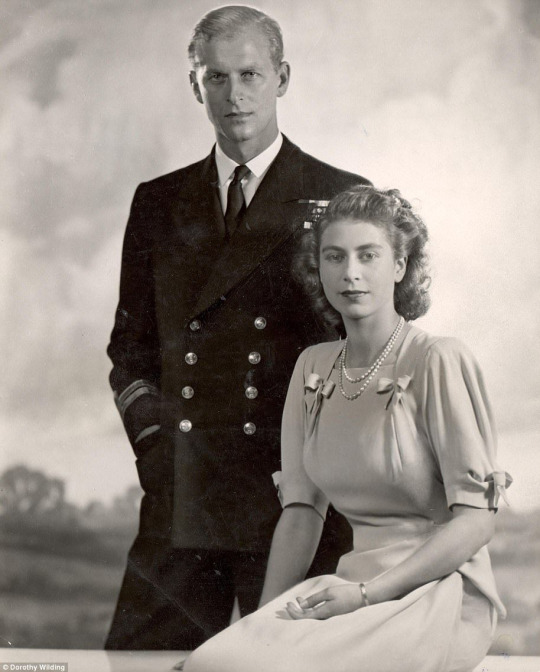
Il principe consorte Philip Mountbatten, duca di Edimburgo, nato principe Filippo di Grecia e Danimarca, sposò la principessa Elizabeth Alexandra Mary Windsor quando lei aveva 21 anni e lui 26. Il loro primo incontro risale al 1939 in occasione della visita di Giorgio VI, il Re balbuziente, al Royal Naval College di Dartmouth. Elisabetta aveva 13 anni e si innamorò subito di quel bel cuginone di cinque anni più grande di lei vestito di tutto punto come un ammiraglio. I due avevano in comune la trisnonna, la Regina Vittoria, i cui figli erano Re Edoardo VII, bisnonno di Elisabetta, e Alice di Sassonia Coburgo-Gotha, bisnonna di Filippo.
Il fidanzamento fu ufficialmente annunciato al pubblico nel luglio del ‘47. Filippo rinunciò ai suoi titoli regali greci e danesi, nonché alla sue pretese sul trono di Grecia (suo nonno paterno era Giorgio I di Grecia) oltre ad essere costretto a convertirsi alla religione anglicana (da greco nato a Corfù lui era ortodosso). Al matrimonio, che avvenne il 20 novembre dello stesso anno, presenziò della sua famiglia solo la madre, essendo i parenti tedeschi del duca e le sue sorelle in rapporti di parentela più o meno stretti con nobili e principi tedeschi compromessi con il nazismo. Filippo fu naturalizzato inglese in virtù del ramo materno.
Sposatosi, proseguì la carriera militare nella Marina, la sua grande passione oltre al Polo, e fu proprio la moglie ad insignirlo più tardi del titolo di Lord Grand'Ammiraglio in occasione del suo novantesimo compleanno (“che gli facciamo al principe Filippo di regalo, ha già tutto… ma sì, facciamolo Grand’ammiraglio”). La coppia ebbe per figli Charles Philip Arthur George Mountbatten-Windsor (Carlo, principe di Galles, erede al trono), Anne Elizabeth Alice Louise Mountbatten-Windsor coniugata Laurence, principessa reale, Andrew Albert Christian Edward Mountbatten-Windsor, duca di York ed Edward Antony Richard Louis Mountbatten-Windsor, conte di Wessex.
Cogliamo l’occasione per augurare al Principe Filippo, filantropo e benefattore dell’umanità che proprio in questi giorni si trova ricoverato per una grave infezione presso il King Edward VII di Londra di campare i proverbiali cent’anni.
13 notes
·
View notes
Text
'The first time I remember meeting Philip was at the Royal Naval College, Dartmouth, in July 1939, just before the war. (We may have met before at the coronation or the Duchess of Kent's wedding, but I don't remember).'
'I was 13 years of age and he was 18 and a cadet just due to leave. He joined the Navy at the outbreak of war, and I only saw him very occasionally when he was on leave - I suppose about twice in three years.'
'Then when his uncle and aunt, Lord and Lady Mountbatten, were away he spent various weekends away with us at Windsor. Then he went to the Pacific and Far East for two years.'
'The wedding ring will be made of Welsh gold, but not from the Craigwen mine.
'The engagement ring was made by Antrobus. Princess Alice took it in as Philip obviously couldn't but he designed the ring.
'I don't know the history of the stone, except that it is a very fine old cutting. It was given to me not long before the engagement was announced.'
'Philip enjoys driving and does it fast! He has his own tiny M.G which he is very proud of – he has taken me about in it, once up to London, which was great fun, only it was like sitting on the road, and the wheels are almost as high as one’s head.'
'On that one and only occasion we were chased by a photographer which was disappointing.'
'We both love dancing - we have danced at Ciro's and Quaglino's as well at parties.'
'We first started seeing more of each other when Philip went for a two-year job to the R.N Petty Officers School at Corsham - before that we hardly knew each other.'
'He'd spend weekends with us, and when the school was closed he spent six weeks at Balmoral - it was great luck his getting a short job first them!'
Elizabeth

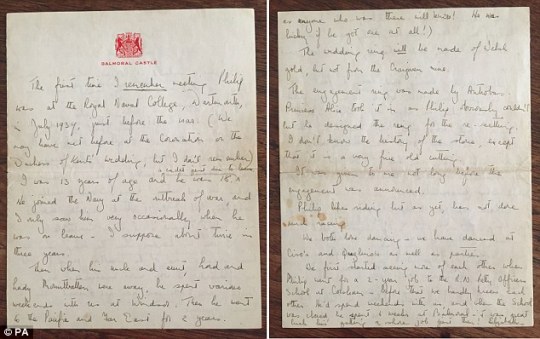
118 notes
·
View notes
Note
How rich is Alice?
well apparently the combined cullen fortune is forty-six billion dollars. I don’t know that they bother to make distinctions of which money is whose—all the cullens seem to have an insanely cavalier attitude about money. apparently there’s enough cash “to keep a small country afloat” laying around their house. bella takes “twice the yearly income for the average american household” just from alice and jasper’s bedroom in BD (that’s about 120 grand.)
we’re told that “money [is] just something [they] accumulate,” and that it comes from:
carlisle’s doctor salary + up to 300 years’ worth of interest
the masen family fortune + ~100 years’ worth of interest
alice’s ability to predict the stock market
now, skipping right past how that works and just suspending our disbelief, I think we can assume that a large portion of the Cullen Ca$h™ was made by alice. I always hc that she’s the one who took them from, like. “own a nice beach house” rich to “own an island, bribe dartmouth, launch cars into space for the lols” rich. but ymmv!
#asks#anonymous#other sources say 34.1 billion $$#the point is it's an obscene amount of money even for absurd fantasy purposes#fwiw the cullens absolutely MURK christian grey in terms of wealth#erika couldn't dream as big as stephenie it seems
171 notes
·
View notes
Photo
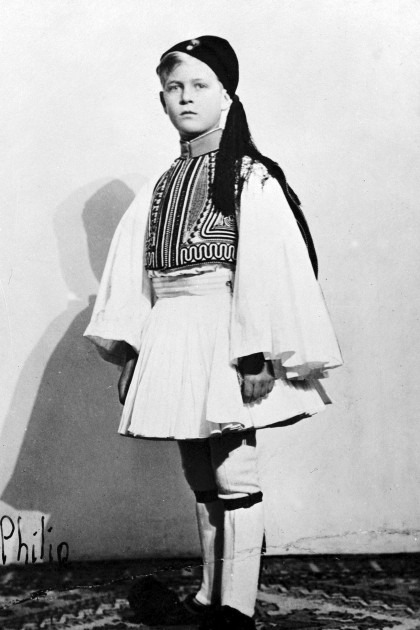

Per quelli che deridono quest’uomo, questa è la sua vita prima che conoscesse la futura regina Elisabetta (da Wikipedia)
Filippo era nato il 10 giugno 1921 presso Villa Mon Repos, sull'isola di Corfù; unico figlio maschio e quinto nato del principe Andrea di Grecia e della principessa Alice di Battenberg,[7] fu battezzato con rito ortodosso nella chiesa di San Giorgio presso la cappella del Palaio Frourio (l'antica fortezza di Haddokkos) alcuni giorni dopo la sua nascita. Suoi padrini furono la nonna paterna Olga Konstantinovna di Russia, lo zio paterno Nicola di Grecia e la comunità di Corfù, rappresentata dal sindaco Alexander Kokotos e dal presidente del consiglio comunale cittadino Stylianos Maniarizis. Alla nascita era membro della casata di Glücksburg, la famiglia regnante in Danimarca, ed era principe di Grecia e Danimarca in virtù della sua discendenza diretta da Giorgio I di Grecia e Cristiano IX di Danimarca, nonché titolato a succedere ad entrambi i troni.
Pochi mesi dopo la nascita di Filippo, morì a Londra suo nonno materno Luigi di Battenberg. Luigi era stato naturalizzato cittadino britannico e, dopo un onorevole e lungo servizio nella Royal Navy, aveva rinunciato ai suoi titoli di origine tedesca e aveva adottato il cognome "Mountbatten", più inglese rispetto al tedesco "Battenberg". Dopo i funerali tenutisi a Londra, Filippo e sua madre ritornarono in Grecia, dove il padre rimase al comando di una divisione dell'esercito che fu coinvolta nella guerra greco-turca (1919-1922).[8]
La guerra non fu favorevole alla Grecia e i turchi vinsero, creando la moderna Repubblica di Turchia. Il 22 settembre 1922 lo zio di Filippo, il re Costantino I di Grecia, fu costretto ad abdicare e il principe Andrea, assieme ad altri, fu arrestato dal governo militare insediatosi. Il comandante dell'esercito reale (il generale Georgios Hatzianestis) e cinque politici furono passati per le armi e si temette per la stessa incolumità del principe. Nel dicembre di quell'anno, però, il tribunale rivoluzionario decise di bandirlo per sempre dal suolo greco.[9] L'incrociatore britannico HMS Calypso permise quindi alla famiglia di lasciare la Grecia (Filippo fu trasportato in una cassa di arance). La famiglia si trasferì in Francia e si stabilì a Saint-Cloud, sobborgo di Parigi.[10]
Filippo crebbe quindi in Francia ma, nel 1928, sotto la guida di suo zio Louis Mountbatten, fu inviato nel Regno Unito per frequentare la Cheam School, vivendo con la nonna Vittoria Alberta d'Assia a Kensington Palace e con lo zio Giorgio Mountbatten a Lynden Manor.[11] Nei successivi tre anni, tutte le sue sorelle sposarono nobili tedeschi e sua madre fu ricoverata in una casa di cura dopo che le era stata diagnosticata la schizofrenia, il che le impedì quasi del tutto di avere contatti col figlio.[12] Suo padre si spostò in un piccolo appartamento a Monte Carlo.[13] Nel 1933 Filippo fu inviato alla Schule Schloss Salem in Germania, diretta da uno dei suoi cognati, il margravio Bertoldo di Baden.[14] Con la salita al potere del nazismo, il fondatore della scuola Kurt Hahn, che era ebreo, fu costretto ad aprire una nuova scuola a Gordonstoun, in Scozia, a causa delle persecuzioni razziali, e quindi anche Filippo si trasferì in Scozia.[15] Nel 1937 sua sorella Cecilia, suo cognato Giorgio Donato d'Assia e due suoi nipotini perirono nell'incidente aereo di Ostenda; Filippo, appena sedicenne, partecipò ai funerali che si tennero a Darmstadt. L'anno seguente lo zio e tutore Giorgio Mountbatten morì di cancro alle ossa.
Dopo aver lasciato Gordonstoun nel 1939, Filippo entrò nella Royal Navy, diplomandosi l'anno successivo al Britannia Royal Naval College di Dartmouth come miglior cadetto del suo corso.[16] Nel 1940 fu assegnato al servizio attivo e trascorse quattro mesi sulla nave da guerra HMS Ramillies con il compito di proteggere i convogli dell'Australian Expeditionary Force nell'oceano Indiano. Dopo un imbarco di due mesi sulla HMS Kent, sulla HMS Shropshire e in Ceylon (oggi Sri Lanka), fu trasferito dall'oceano Indiano alla nave da battaglia HMS Valiant nel Mediterraneo. Tra gli altri incarichi fu coinvolto nella battaglia di Creta e ottenne delle note di merito per il suo servizio durante la battaglia di Capo Matapan, ottenendo la croce di guerra greca al valore.[16]
Filippo fu promosso da guardiamarina a sottotenente dopo una serie di corsi a Portsmouth.[17] Nel giugno del 1942 fu assegnato sulla HMS Wallace, che fu coinvolta nelle operazioni dello sbarco alleato in Sicilia per la liberazione della penisola italiana.[18] Promosso tenente il 16 luglio 1942 alla età di soli 21 anni, nell'ottobre dello stesso anno divenne primo tenente della HMS Wallace e uno dei più giovani ufficiali della marina britannica. Nel 1944 si imbarcò su un nuovo cacciatorpediniere, il HMS Whelp dove prestò servizio nel Pacifico, nella 27ª flottiglia britannica.[19][20] Era presente nella baia di Tokyo quando fu firmata la resa del Giappone. Nel gennaio del 1946, Filippo fece ritorno nel Regno Unito sulla HMS Whelp e fu nominato istruttore presso la HMS Royal Arthur, il campo d'addestramento della marina a Corsham.[21]
5 notes
·
View notes